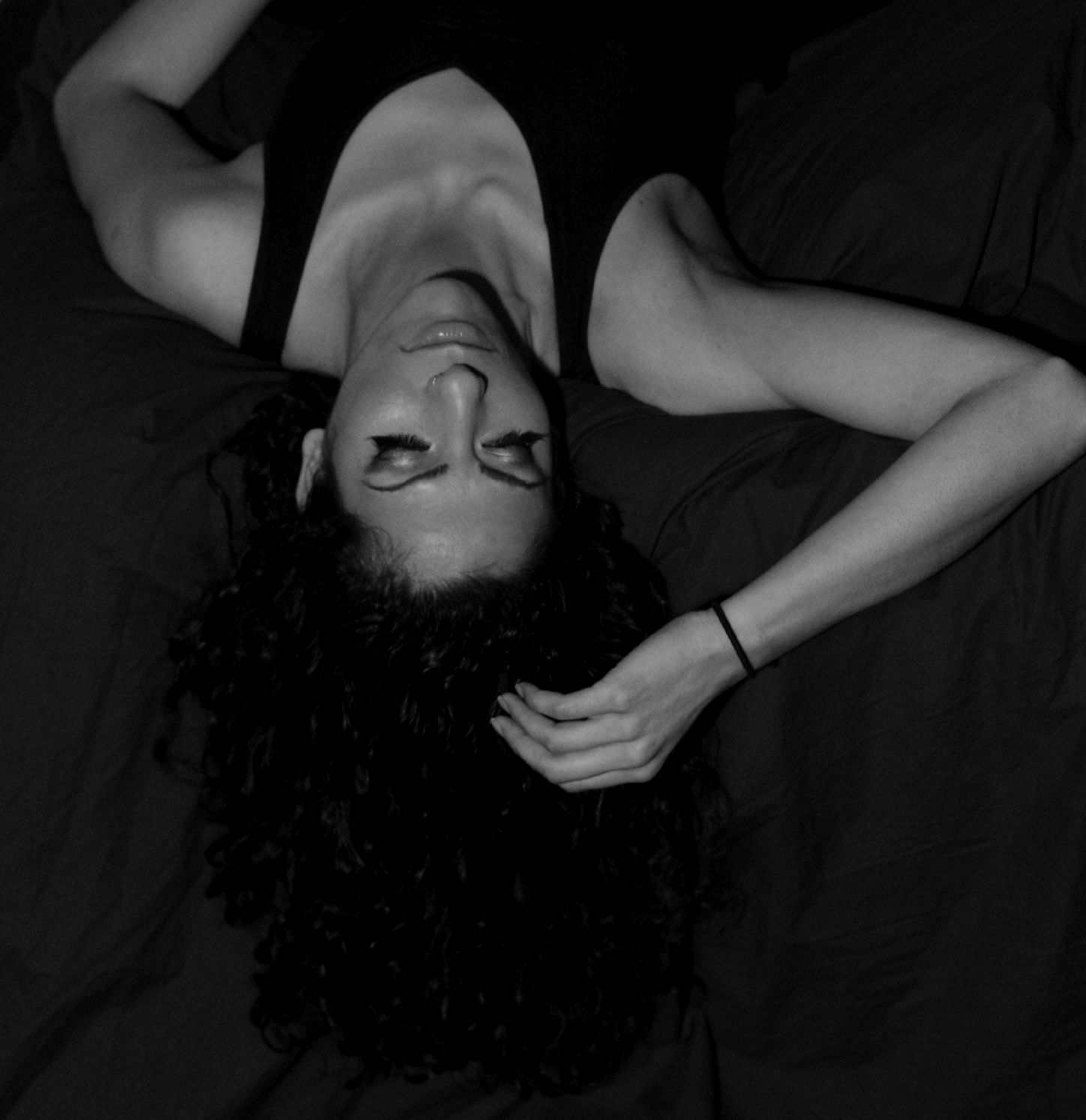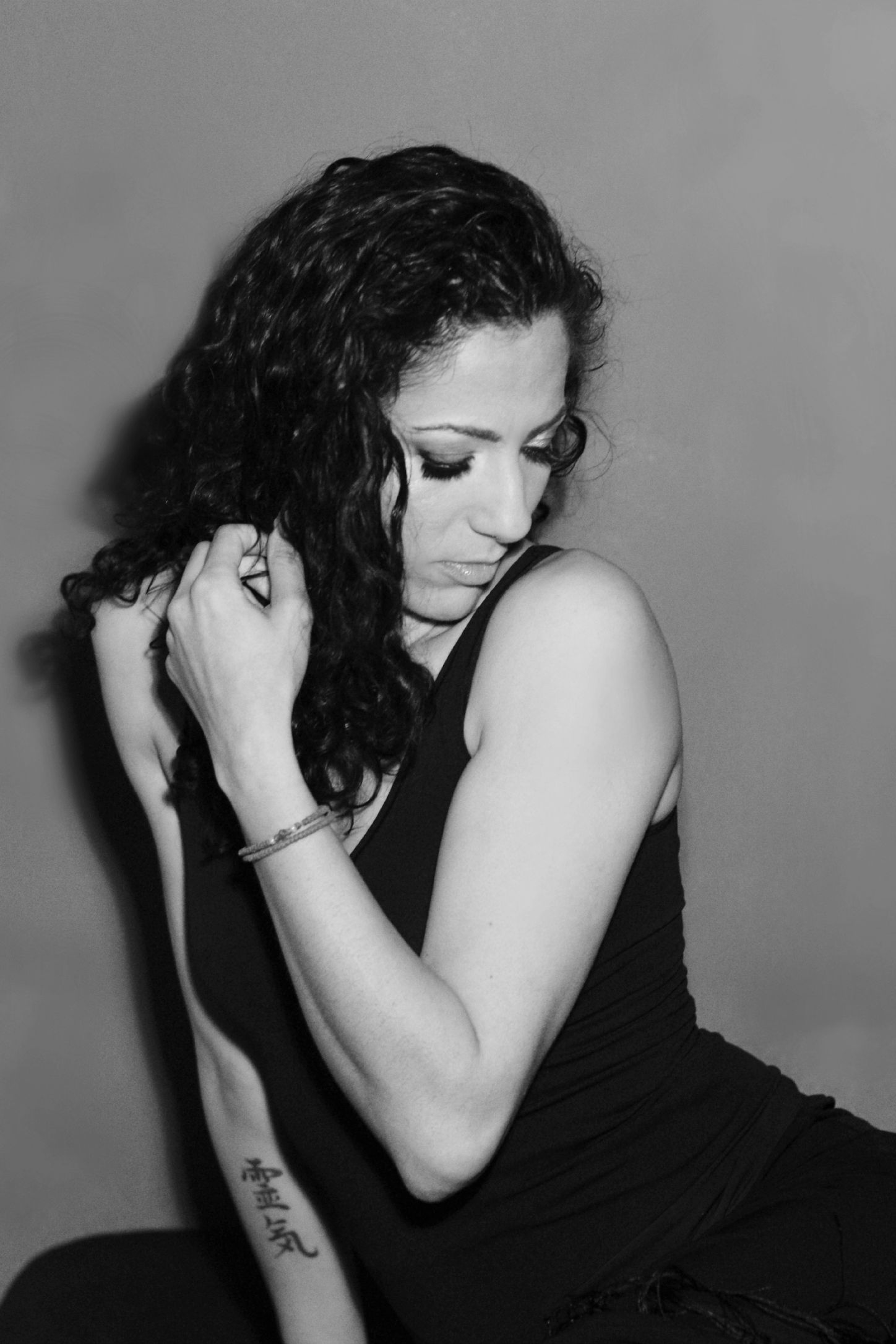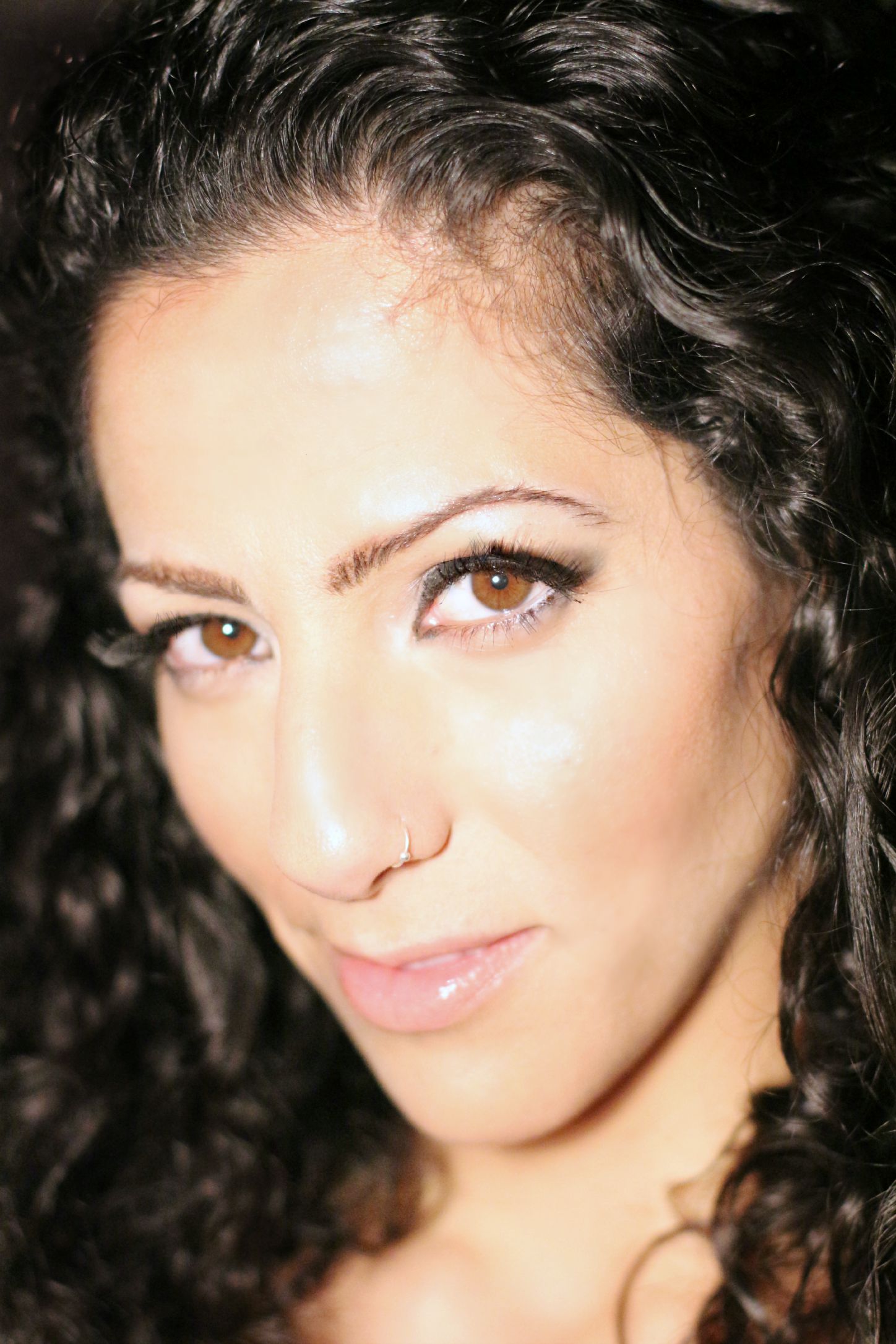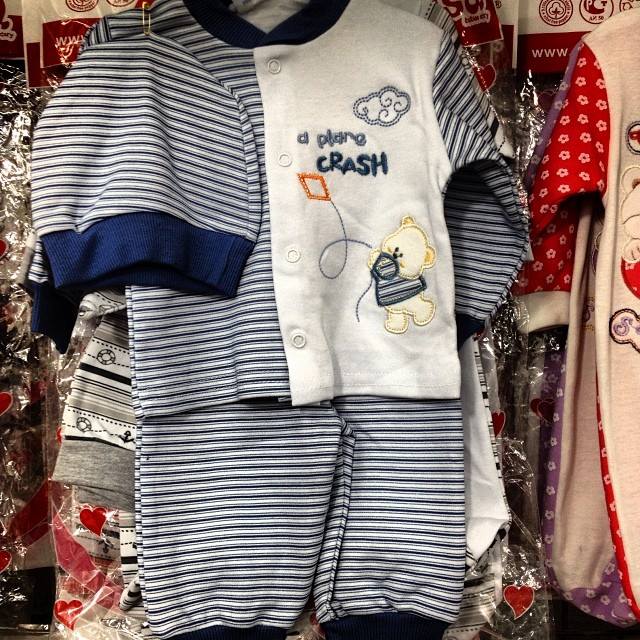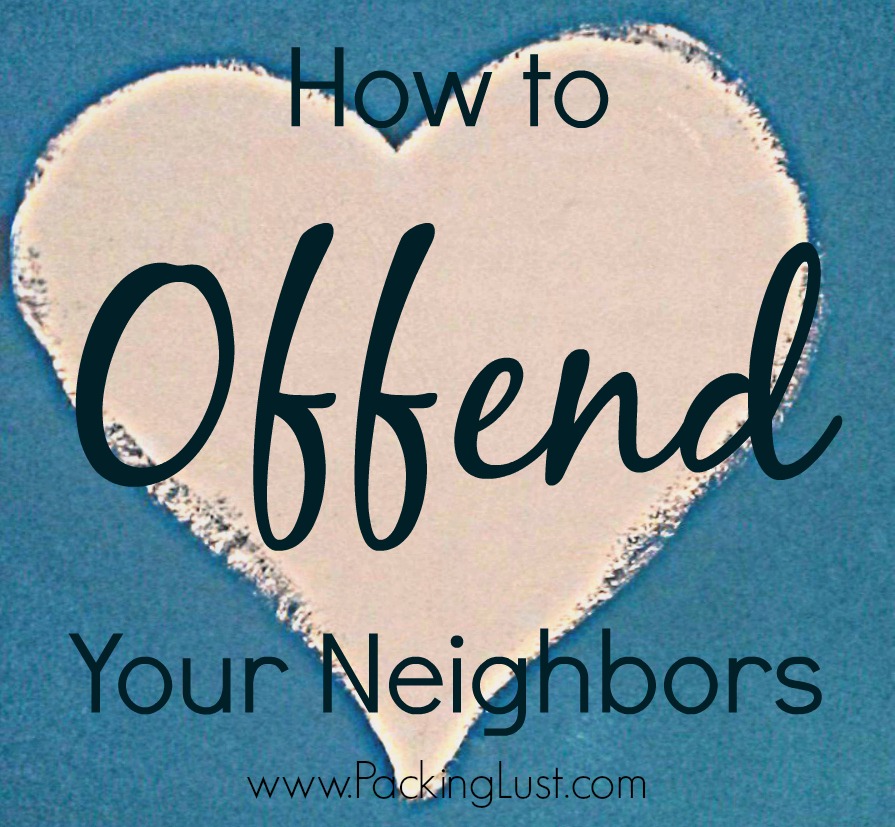My Snowball Fight in Palestine
Late 2013
I was out walking in the snow when I saw a group of young men who made me begin to doubt the wisdom of my strol.
They emerged from a hookah joint housed in the bottom floor of a large buildin in downtown Ramallah, the seat of the government of Palestine. I was the only woman around, the only person around on the deserted, snow-gray streets. Just me and the red-eyed men rifting out of the café toward me.
It had been snowing for days. All across the West Bank, there was an extended power outage. People washed with water heated on a gas stove and huddled around their propane heaters. We had two; the larger one we lovingly called our R2D2, and the smaller one we delighted in calling by the brand name etched onto its metal plate: ORGAZ. I was still cold. No matter how many blankets I layered around me or heaters I crouched in front of, my feet and nose stayed cold. I was angry cold. Bored cold.
The anger, fueled by the cold and pent-up energy, made me feel restless and twitchy. I bundled up, put some plastic bags over my shoes to help keep the hree feet of snow out, and announced to Prince Charming that I was going for a walk. I left with a quick "bye!" without giving him much time to respond. I heard him manage to eke out a "be safe!" and I was off.
My cabin fever was quickly replaced by wonder. Glittering snow banks smothered the garden and turned trees into bowing swans. Getting from our apartment's vestibule to the street was tricky. I had to find a way around and through the snow banks. Having grown up mostly in moderate climes where a few inches of snow a year was the norm, I had no snow-walking skills to draw from. Each step I took was a new experience. My foot would sink down six inches, then when I lifted up the other foot that first one would sink down another ten inches into the snow. I hobbled my way out to the street, where the snow was less thick and a truck had made a pack-snow indentation I could follow.
I threw my head back and gazed at the sky to take in the joy of being outdoors, finally. It was still snowing, gently, not the thick blizzard of the last few days. When I got to the main street, I could turn left, or I could turn right. Left would take me away from the city center. Right would take me towards the city center, Al-Manara, where there's a monument with four stone lions that has become the iconic backdrop to many Palestinian protests against the Israeli occupation. I turned right. The city was feeling a little post-apocalyptic-deserted, and I was hoping I'd bump into someone in the center, anyone, a friendly face. I imagined we'd gesticulate to each other about the eauty of the now; it would be easy even though we might not speak the same language.
But instead of a friendly face, I saw the men. Unsmiling young men, maybe seven, with more behind them, jacked up on icotine. One puff on a hookah pipe was, I'd heard, the equivalent of smoking a bundle of ten cigarettes, so if they'd been smoking all morning, well, it was s if they' alread smoked hundreds of cigarette that da. Restless energy coursed through their wiry bodies. I'd heard these oung en called "shebab." I wasn't sure what it meant. It seemed to denote "outh," but the connotation was "unemployed, disenfranchised, hopeless, able-bodied oys and men who must roam the streets because they have nothing else to do." As they emerged from the café, I was reminded of a scene from the 2007 movie I Am Legend, where Will Smith's character is stalked by bloodthirsty mutants who hibernate in clusters in dark corners of the city. They moved slowly in my direction, as if meandering, but their bloodshot eyes, I noticed, were intensely focused. On me.
Suddenly I felt very self-conscious. Afraid. My active imagination quickly supplied me with headlines of the "Brutal Gang Rape" variety. I had a friend who'd been sexually harassed on the street not far from here I was. I looked around, behind me. No one. Just me and the shebab grouping. Get a grip, I thought. These are not bloodthirsty mutants. These are people, just like me, curious. It's human curiosity to want to see the foreigr alking by herself in the snow.
ut I had to take action. I couldn't continue my walk nwards, knowing I was getting farther from home and that I'd have to walk past the shebab again on my way back. I'd be scared the whole time. I couldn't turn around either, not without an interaction. I didn't know how they'd take it. It might be okay. Or they might follow me back, harassing me the whole way, finding out where I lived. They might just leave me alone, thinking I was scared of them, which was true.
Either way, they'd have effectively ruined my stroll, and the thought made me angry. I wasn't going to let these guys ruin my outing. I was so tired of sticking out on the street, of being the foreigner, of being looked at with an inscrutable combination of lecherousness and discomfort. I was an oddball. An American woman who wasn't afraid to go jogging on the streets, show my knees, or yell curse words at wayward bus drivers.
So I bent down, packed some snow together, and, smiling, hurled ball of snow at the man closest to me.
My snowball glanced off his legs. is reaction took a moment. Surprise. Then delight. Whether malicious or kind, I couldn't tell.
I was betting that the bridge-building power of a good snowball fight was universal. e gathered up a snowball of his own, and pitched. is was no lo. The speed ball hit me square in the face, the impact leaving me breathless. I couldn't feel my mouth or nose anymore. When sensation started to come back, everything stung. I tried to smile, hoping that's what my mouth was doing; I still couldn't really feel my face. Bleak pain. Oppressed young men of the West Bank have one weapon left. One way to fight back, vent frustration, protest, cause damage. Stone throwing. They learn young and, as observed by horrified Israelis, can do impressive damage and some even claim there have been several deaths resulting from stone throwing. I'd picked a snowball fight wit throwin experts. I gathered my second snowball and made what I was hoping would be seen as a spirited throw, a game attempt by the obvious underdog. But instead of cheering me on, one of the bystanders joined his fellow shebab and chucked another snowball at me. Then a third joined the fight against me. At this rate I'd be unconscious within moments, was my only slightly hyperbolic thought.
I had to win allies, and fast. I opened my arms wide, palms up, trying to figure out how to get some of these guys on my team. My Arabic was meager at best, but in the moment I remembered how to ask for help. I tried the phrase, pointing to two others who hadn't gotten involved so far. I gestured, inviting them to my side. I tried to say some numbers I'd learned, Arabic to express that I needed more people I my team.
They understood. I could see it click: of course. A fair fight. Three against three. Quickly a couple of them joined my side scooping up snow and throwing icy projectiles at the other shebab.
Chivalry wasn't dead. Disparity would be addressed. Justice might win.
I exhaled a huge sigh of relief. And despite my aching face and earlier apprehension, I started to have fun. More customers of the hookah cafe joined both teams.
After what I shall diplomatically refer to as a tie, we ended the game. Our hands were cold, blood was pumping, spirits were high. We were all one team, just a group of young people playing in the snow. I waved goodbye, said "Ma'a Salama."
I walked home no longer angry cold or bored cold. I'd found a friendly face. More than one.
5 Reasons to Have Hope for Palestine
By the time this blog post publishes, we will, if all goes according to plan, be back in the U.S. and our time in Palestine will have come to an end. It's been a challenging and adventurous 28 months here. With the ongoing conflict and occupation, it can be hard to stay hopeful about Palestine's future, but there is hope. I want to leave Palestine with hope that the people here will one day be free, and that the conflict will come to a peaceful and just resolution. To share that hope with you, I've compiled a brief list of links and reasons why I have hope for Palestine. These five (mostly non-political) things give me reason to be optimistic about this place.
1. The Arc
Many people in Palestine hope for a one-state solution to the conflict: a single, democratic state where all people can live freely in equality no matter their race or religion. While I think that idea is wonderful, I see it as unlikely. I think a toxic amount of racial injustice would result if the two countries were to become one and it would be very difficult for everyone to have equal opportunities because of the history here. However, perhaps it's better to try and face those obstacles than not try at all. A second-best and still hopeful option would be a two-state solution, with a free and independent Palestine living in peace with Israel.
Enter the Arc. The Arc is part of a plan for the physical infrastructure a successful Palestinian state would need. Created by the Rand Corporation, The Arc gives an important and inspiring vision for a thriving Palestine. Check out the 9-minute overview video here. It's worth a watch. More resources on the Arc are available here.
2. Occupied Pleasures
Photographer Tanya Habjouqa is capturing some amazing images of Palestine and Palestinians. From photos of the head-to-toe covered women of Gaza to images of belly-dancing Palestinian drag queens in East Jerusalem, her work is diverse and fascinating. Most importantly, the images reveal the deep humanity of a much-misunderstood group of people.
3. An Israeli Soldier Speaks
This compelling talk by former Israeli soldier Eran Efrati will give you an inside view into what it's like to be an Israeli soldier occupying Palestine and having the earth-shattering realization that you're "on the wrong side of history." His emotional, heart-breaking, and at times funny speech allows us to see what the conflict is like up close on the ground from both sides. It really is a must-watch, revealing talk. To read more soldier testimonies, check out the book Our Harsh Logic.
4. Juthour Arboretum
From the website "Juthour Arboretum in Ramallah offers a natural reserve where we preserve native trees and plant species, working through educational programs and eco tourism to model and encourage greater individual and communal responsibility towards our threatened natural environment and heritage in Palestine." This eco-park was started by our friends and neighbors in Ramallah, Palestine. I've visited and hiked its terraces many times with Jelly Bean. They've put an incredible amount of work into saving trees so that Palestine's natural heritage will not be forgotten or destroyed by the many threats to it such as the occupation, violent extremist settlers, over-development, construction dumping, and littering. Check out and support what they are doing, especially if you care about preserving the natural beauty of Palestine.
5. The People
I've met some incredible people here, resilient people who have an amazing ability to keep going and maintain hope in the face of an under-occupation experience ranging from the utter monotony of three hours of checkpoint traffic to the overwhelming brutality of missile strikes on civilians in Gaza. To read more about the people we've met here, check out some of the posts in the Palestine category.
Holy Land Sites: Nazareth and the Dome of the Rock
In late May and early June my dear friend Kimberly came to Palestine to visit us.
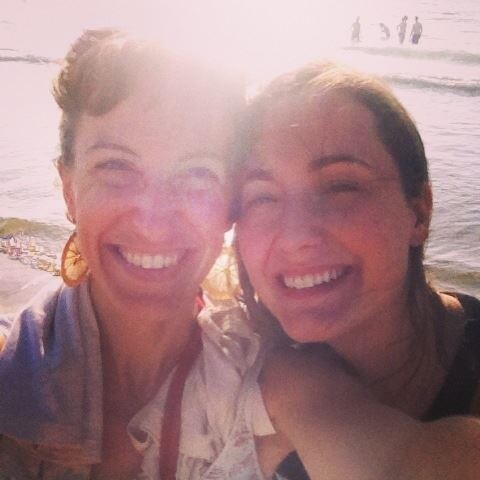
Kimberly is a friend I've known for a long time - since before our first year of college when I called her in the summer of 2003 to find out what kind of person my future roommate was. I knew we'd be friends when I found out she drove a car that she'd painted the exterior of, covering it completely in brightly colored flowers. She still an artist; now she's a professional painter and muralist. And one of my favorite people in the whole world.
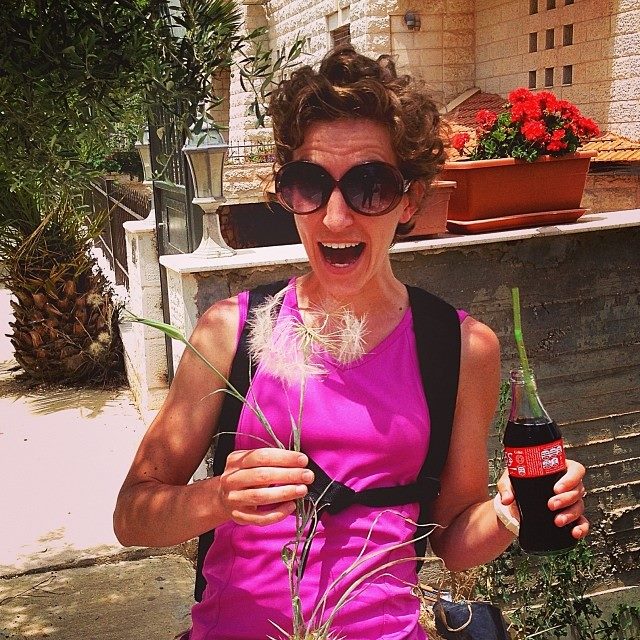
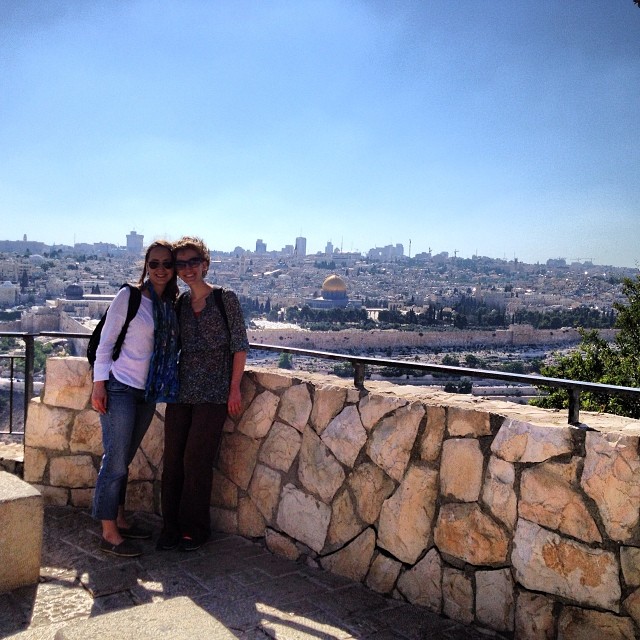
Of course, since this is her first time to the Middle East, we made sure she got to experience plenty of Holy Land sites around Israel and Palestine during her two-week trip. Many of the places we went have been covered previously on this blog, but we did take her to two places that were new to me: the Dome of the Rock in the Old City of Jerusalem, and the Palestinian city of Nazareth in Israel.
Photo credit goes to Kimberly for almost all the pictures in this post.
The Dome of the Rock
Commonly confused with Al-Aqsa Mosque (which has a silver dome) the Dome of the Rock is the famous gold-domed shrine on the Temple Mount in the Old City of Jerusalem. You can see the dome behind Kimberly in this photo.
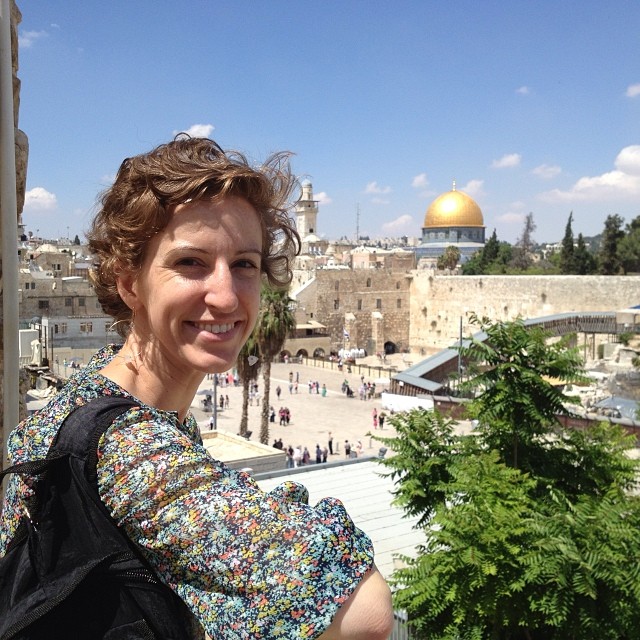
Only Muslims are allowed on the Temple Mount and in the Dome of the Rock, except for during limited visiting hours. Getting to the Old City of Jerusalem is difficult enough that planning to be there during certain hours simply hadn't happened for me previously. However, during Kimberly's visit, we made it happen. The guards told us the visiting hours on our first trip to the old city, and on the second, we experienced the Temple Mount.
First we walked up the wooden footbridge over the Western Wall.
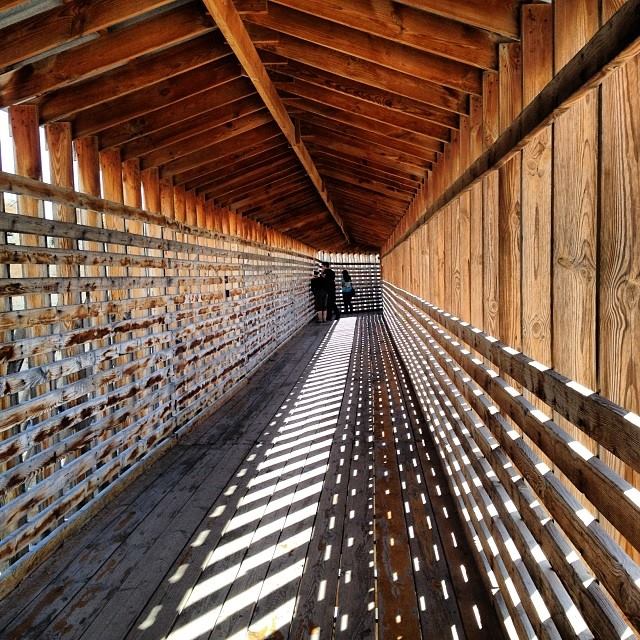
We encountered a stack of riot gear on the way.
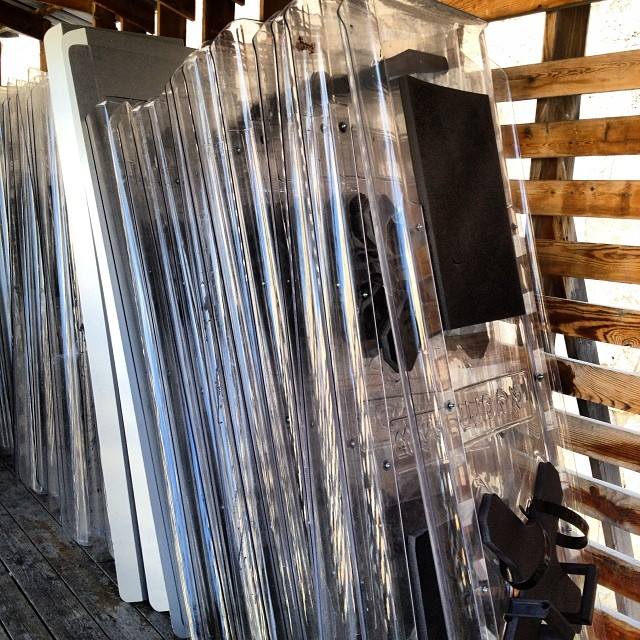
At this point we were in the center of the center of one of the most religiously turbulent places in the world. Through the wooden slats, we peered down upon the holiest place in Judaism, the Western Wall, the only remaining piece of the Temple. Ahead of us lay the Dome of the Rock.
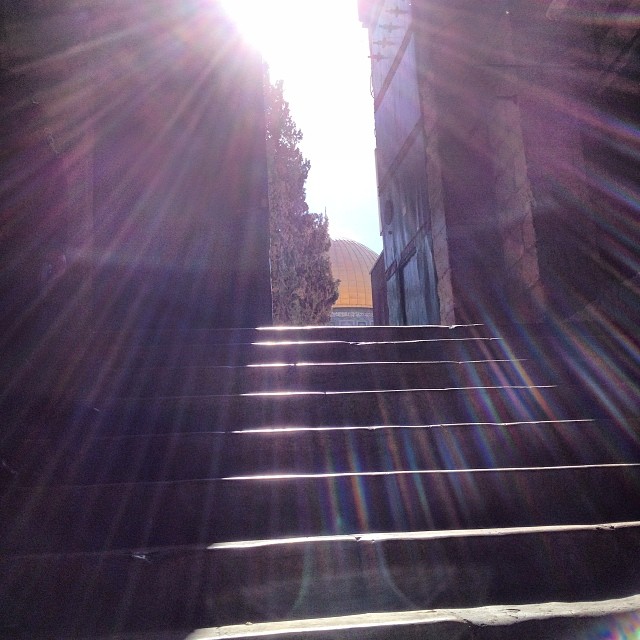
The Dome of the Rock is a sacred site in Islam because tradition says that miracles occurred there, including the Prophet Muhammad's ascension into heaven. Additionally the Foundation Stone around which the Dome of the Rock is built is sacred to Jews as it's considered to be the foundation of the Temple and was the location of the Holy of Holies.
All this results in a strange simmering stew of resentment for members of both religions. On the day we were there, tourists wandered curiously around circles of robed Muslim women who sternly yelled religious chants from texts they held their hands. Some of the tourists appeared to be Jewish, and some were pretending to be Muslim so they could enter the shrine.
One Muslim friend told me he was praying at the Dome of the Rock and a bunch of female Jewish Israeli tourist soldiers entered the male prayer area without appropriate clothing. Apparently the Israeli army uses its military power over the region even to the point of openly disrespecting one of the holiest places in Islam.
Kimberly and I were both labeled as non-Muslims by the guard in front of the shrine, presumably because our heads weren't covered. We weren't allowed to enter, but it wasn't clear whether that was because we weren't Muslim or because we weren't dressed properly. To the guard, it seemed to be the same thing. We circled the shrine and consulted with some tourists who had seen another group of tourists who were allowed to enter. They told us you had to "pass" as Muslim to enter. We were unwilling to lie about our religion, but very willing to dress differently, and that seemed to be all that mattered to the guard. We donned scarves and tried again, only to be turned back because we were wearing t-shirts that showed our elbows.
I'm 80% sure we would've been allowed to enter if we'd covered everything but our face, hands, and feet, so if you are a female non-Muslim who'd like to visit, make sure you dress accordingly.
Kimberly and I had to settle for walking around the grounds of the magnificent shrine.
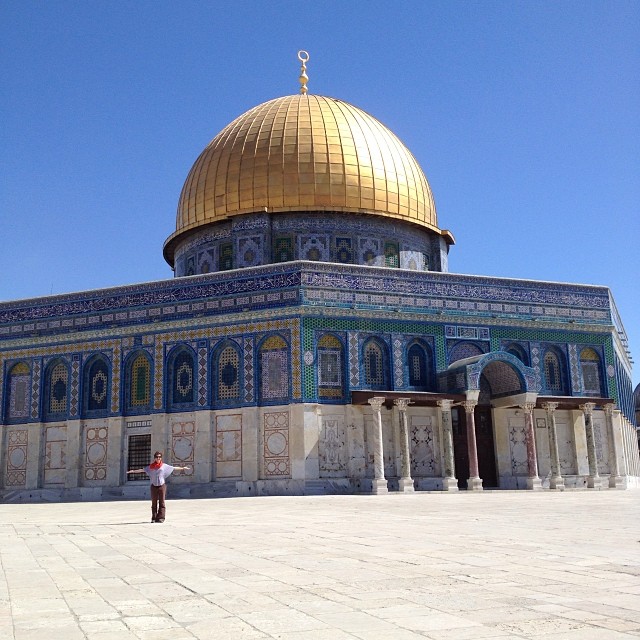
It was truly spectacular.
Nazareth
Nazareth is famous for being the birthplace of Jesus. We toured the Church of the Annunciation, where tradition says Mary received a message from the Angel Gabriel that she would give birth to Jesus.
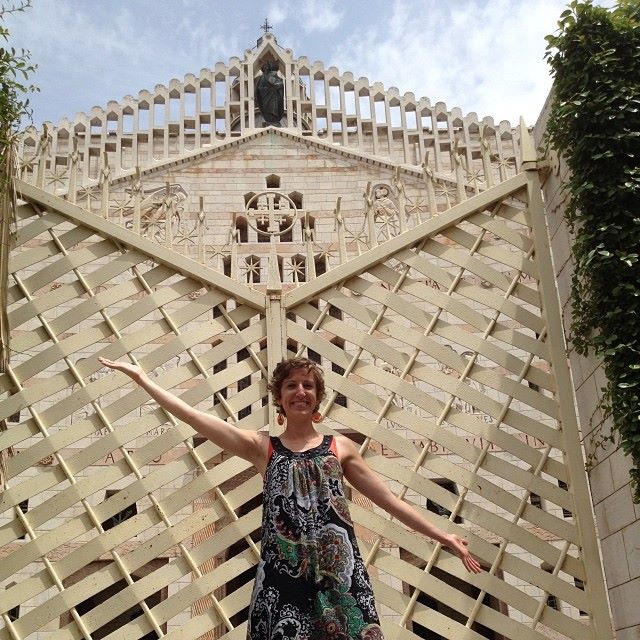
I loved the courtyard of the church, where portraits of Madonna with child hung, each from a different country, and reflecting a different idea of Mary's appearance. My favorites were Thai Mary and Chinese Mary.
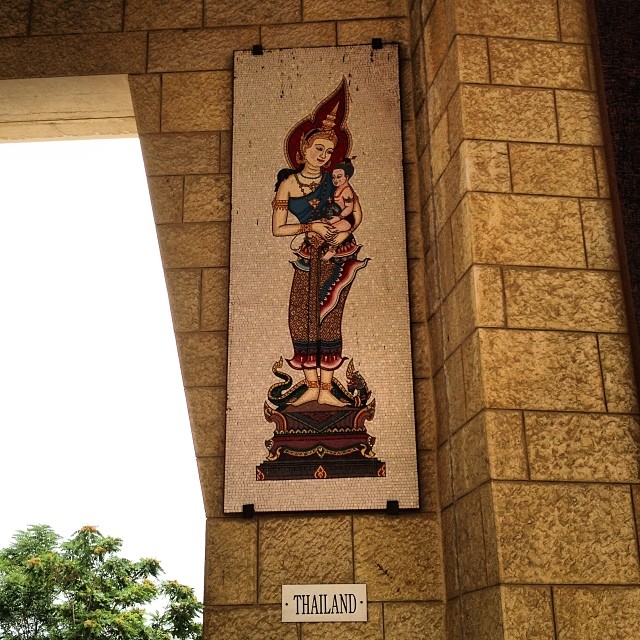
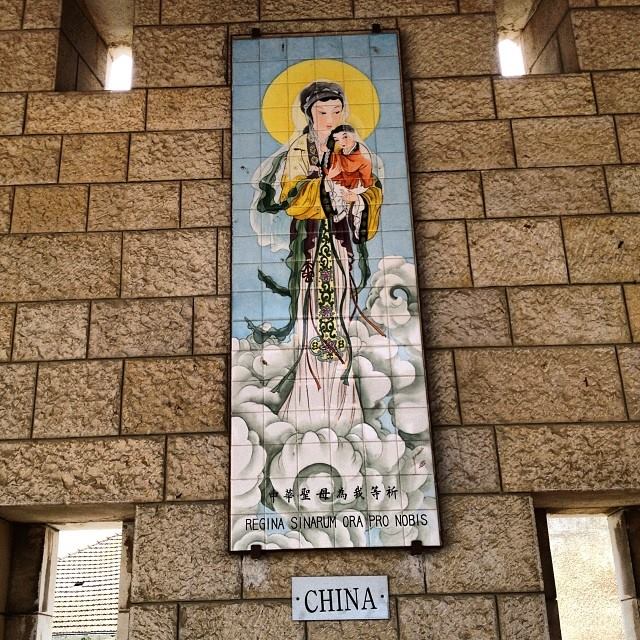
The church is new, so very different in appearance from traditional churches I'm used to visiting. I was happily surprised to discover that the modern interior was warm and soaring. The multiple levels and open central area allowed the chanting from the ongoing Greek Orthodox service to waft up to tourists on the floor above.
None of the photos captured the beauty of the interior, so you'll just have to go visit the church yourself to see it. Here's a sneak peak of the ceiling.
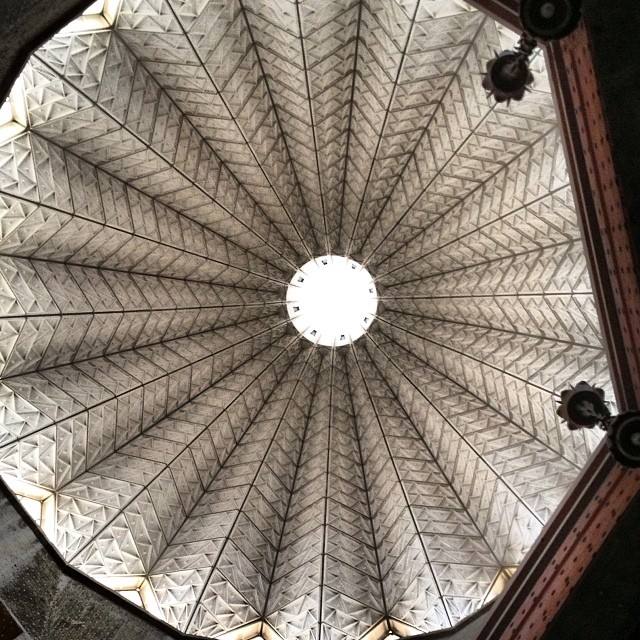
More Fun
Here are a few more photos taken around Israel and Palestine that I can't resist adding.
Kimberly got to see a herd of camels,
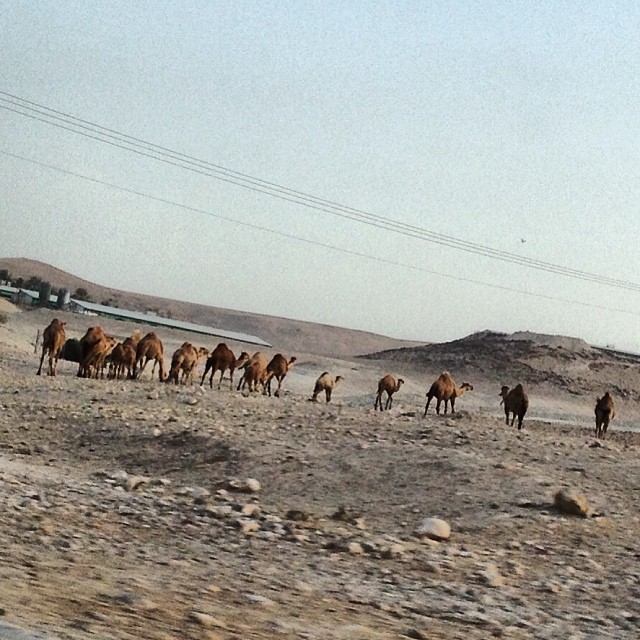
enjoy the Dead Sea and mud,
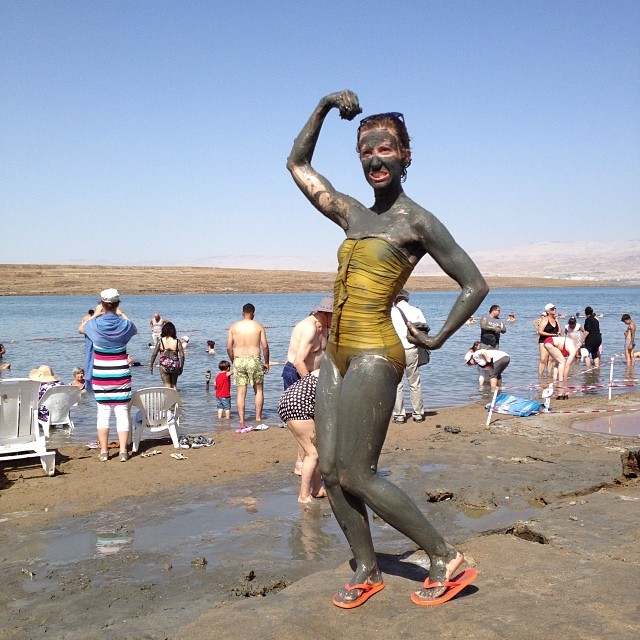
and see the Church of the Sepulchre.
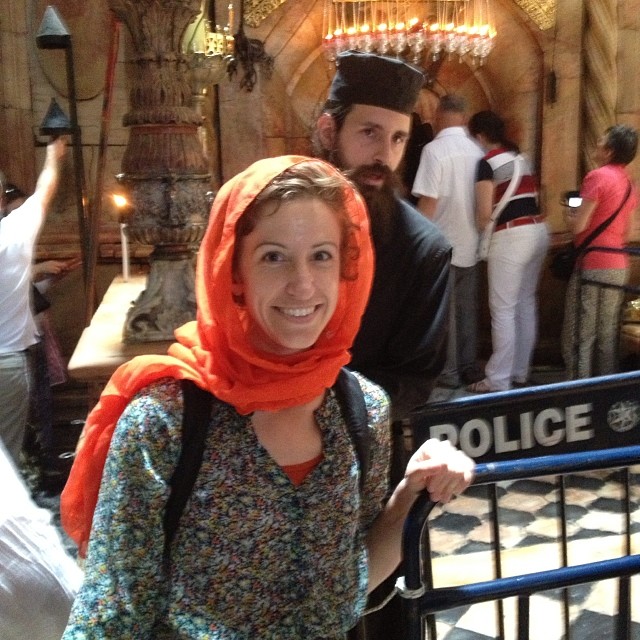
Juthour Arboretum
I also took Kimberly to Juthour Arboretum, our neighbor's project to preserve the natural heritage of Palestine.
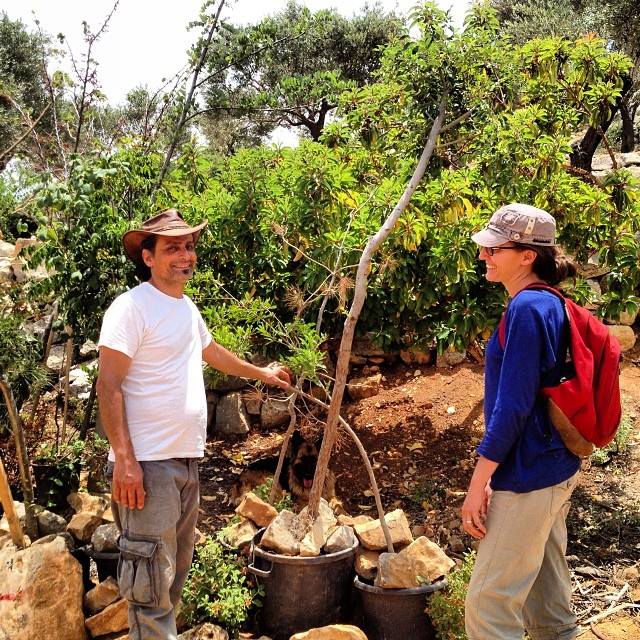
They've made incredible progress on the Arboretum over the past year, and now are running an Indie Go Go campaign to raise funds to forge a sustainable, green Palestine. Please support it below. It's a great cause, and a politically neutral one.
That's Just Wrong
I'll end on a funny note, which is a hilarious onesie we saw when we were shopping for a mutual friend who is having a baby. When clothing with English on it is produced and sold in countries where English isn't widely spoken, this plane-wreck of a fashion situation is what can happen.
Yes, that's for real.
Thanks for a wonderful visit, Kimberly.
My First Trip to Gaza
Foreword: I'm re-posting this old blog entry about my first trip to Gaza because somehow it disappeared entirely from Packing Lust, probably during the transition from my last blogging service to Wordpress, the one I use now. It's one of my favorites, so I was so sad when I thought it was lost to the void forever. (I didn't have a back up of the text, just the photos). However, Prince Charming managed to find an archive of it online, despite my deleting the old blog before I knew it had gone missing. "Nothing can completely disappear from the internet," he says. (I now back up my blog regularly.) This was originally posted December 18, 2012. Enjoy.
Entry at Erez
"You're not a journalist or anything, are you?" the Israeli soldier in the first booth at Erez Crossing Point asked.
"No." But will I write about what I see? Of course.
Until the New York Times picks up this blog, I am not a journalist. I am free to enter the Gaza Strip through the Erez Crossing thanks to Prince Charming's NGO-worker status and my status as his wife. And from this unique position, needing neither journalist's credentials, nor being blocked from writing by my organization (as Prince Charming is), I can simply tell you what I experienced on my first, short trip to Gaza.
Not that it was simple for me to get into Gaza. First, an employee at Charming's NGO got me coordination with the Israel government and a visa with Hamas, the governing body of Gaza.
We arrived at Erez Crossing on December 12th.
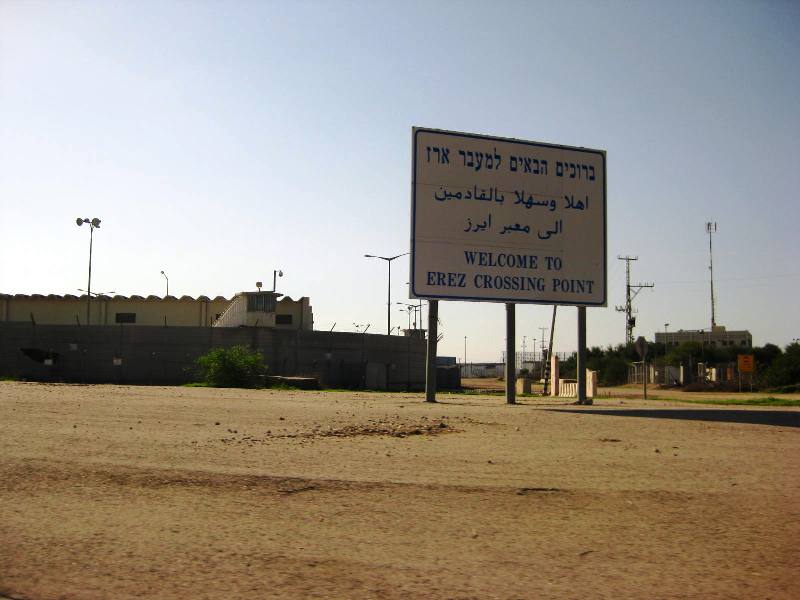
I put my camera away since there was a "no photography" sign at the entrance. The crossing looks like one modern, airy, new airport terminal. It's a large building with a lot of bullet-proof glass and shiny surfaces. We entered after a quick chat with the Israeli soldier who asked if I was a journalist. Then there was an interview with a passport control officer who shuffles papers and flips through every passport. Like many passport officers, she had shimmering, perfectly manicured nails. I think if I were a passport officer, I would too. The only thing there is for a would-be border-crosser to do as you shuffle, flip, and make phone calls is to stare at your hands.
At this point, I need to introduce Osama, one of Charming's colleagus in Gaza. Osama is a Palestinian who lives in Gaza and he is rarely allowed out of the strip. However, he was allowed to visit the West Bank for his job for the first time in a while, and when we went to Gaza, he re-entered with us to rejoin his family.
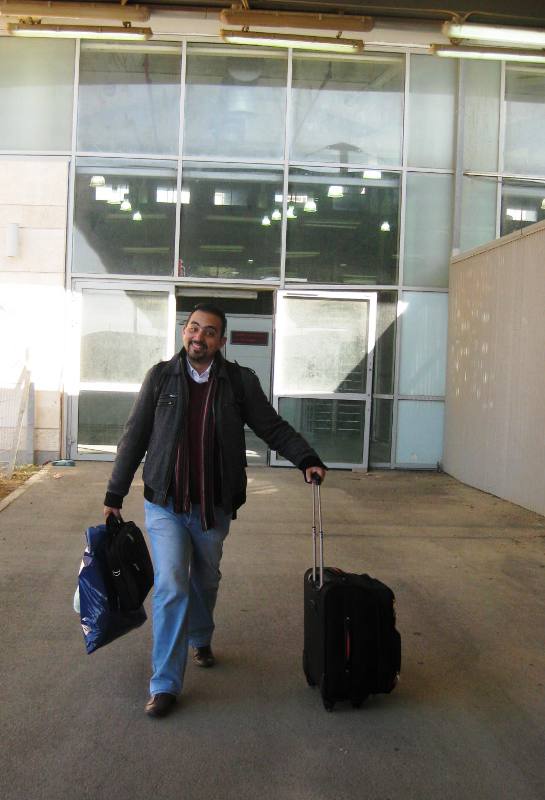 "Back to jail!" Osama said merrily as we entered Gaza.
"Back to jail!" Osama said merrily as we entered Gaza.
Once across the border, we caught a special golf cart we called a tuk tuk that took us across a kilometer of open land that acts as a sort of "no-man's-land" between Israel and the administration of the Gaza border.
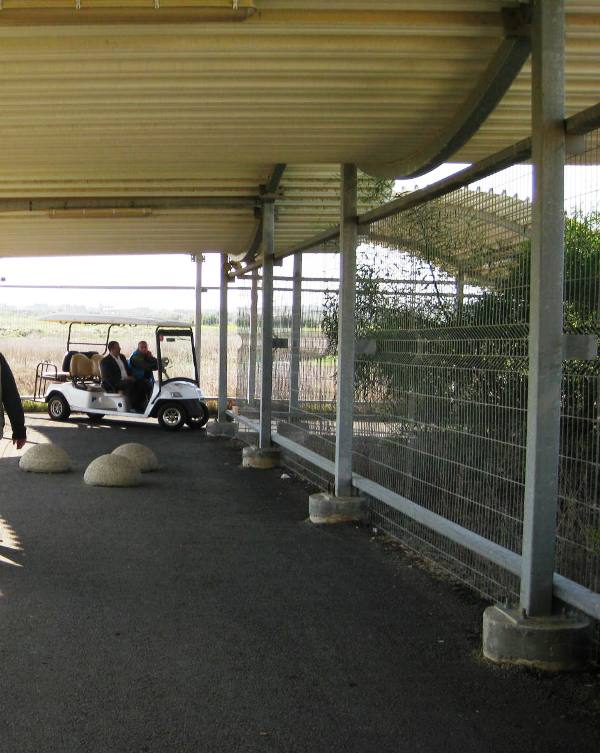
The covered path across no-man's-land.
The tuk tuk is officially for handicapped people, but if it's open, anyone can use it. Charming remarked that the tuk tuk driver has one of the weirdest jobs in the world. Can you imagine when someone asks "what do you do," saying "I drive a golf cart back and forth across the one kilometer separating two countries in conflict."
We then got out at a checkpoint known as Hamsa Hamsa or Five Five, in English. It's run by Fatah, the political party in charge of the Palestinian National Authority, which is the name of the government of Palestine. The Fatah checkpoint is only there because Israel won't talk to Hamas, the political party governing Gaza. Hamas is considered by Israel, the U.S., Canada, the E.U., and Japan to be a terrorist organization. While they seem more humane than other extremist Islamic groups, say the Taliban (who tried to kill Malala Yousafzai), it's their habit of firing rockets indiscriminately into Israel gets them labeled as terrorists.
After the buffer zone of Hamsa Hamsa, we reached Arba Arba (Four Four in English) by cab. Arba Arba is run by Hamas. We picked up our previously arranged paperwork and Hamas officials searched our bags. Cars from the Gaza office arrived and I met more Gaza staff members (of Charming's NGO).
During our twenty minutes at Arba Arba, a magical moment happened. 12/12/12 at 12:12. Charming and I got a photo to memorialize:
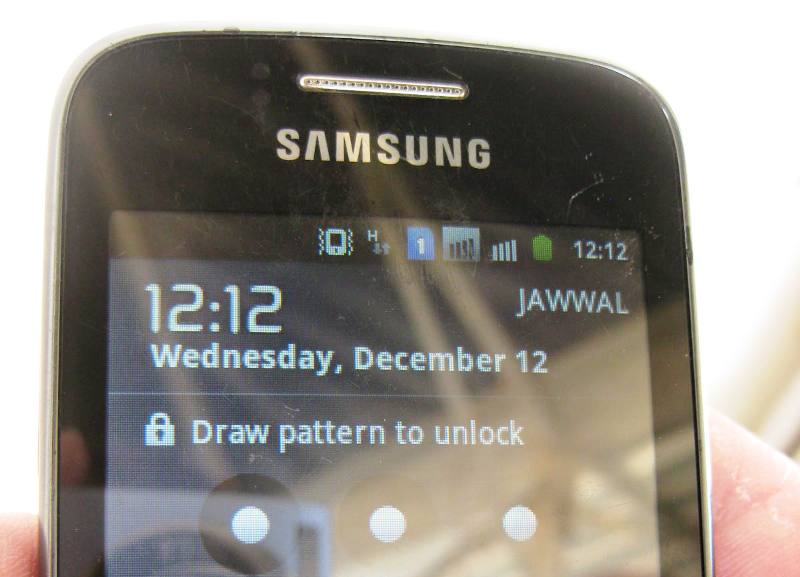
Gaza City
After these three different checkpoints, we arrived in Gaza City. Osama pointed out some of the destruction from the recent conflict. One thing that struck me was the precision of the attacks. Of course the Israelis made mistakes (see above note about children killed) but for the most part, (if we allow ourselves to sweep away the image of 35 dead children with that phrase) Netanyahu kept his promise when he said "...my government has instructed the Israeli Defense Forces to conduct surgical strikes against the terrorist infrastructure in Gaza."
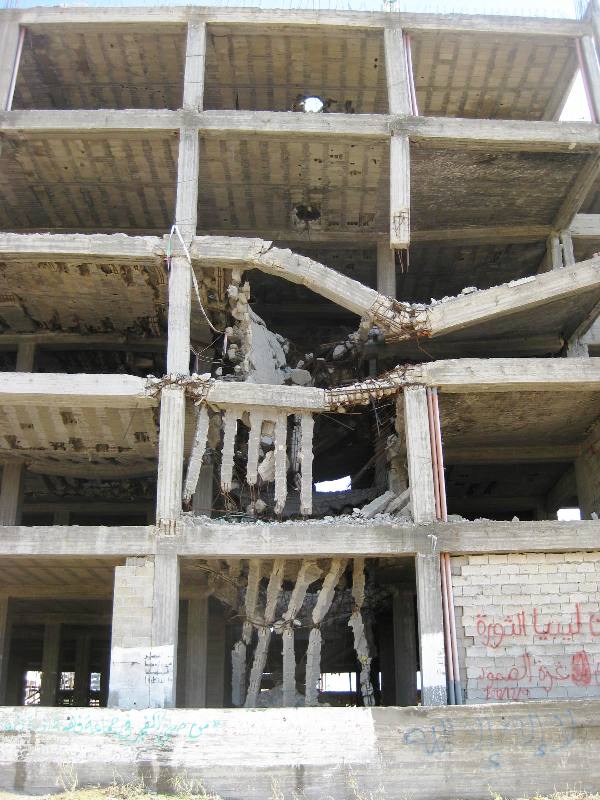
A surgical strike in Gaza City.
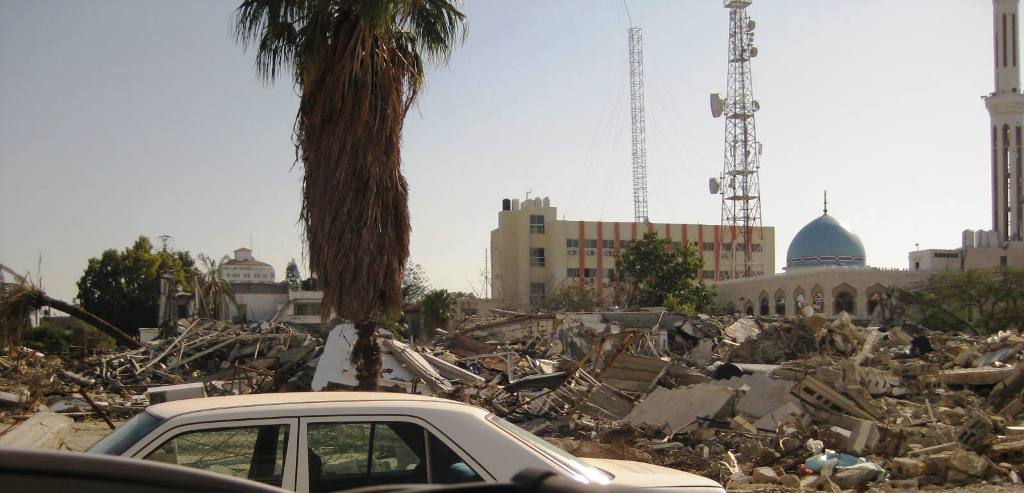
Another precision strike leaves a nearby palm tree and a mosque untouched.
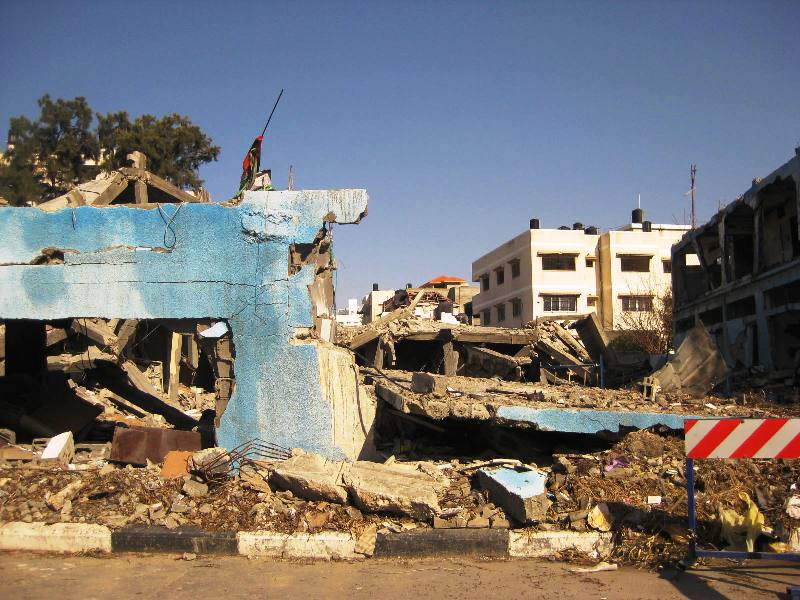
Destruction in Gaza City.
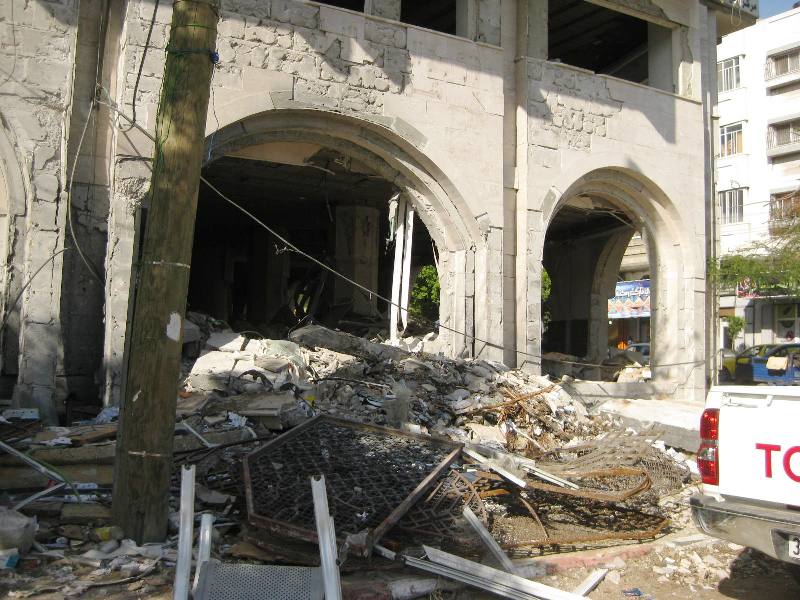
More wreckage in Gaza.
As we drove into the city, Osama greeted a fellow commuter he knew.
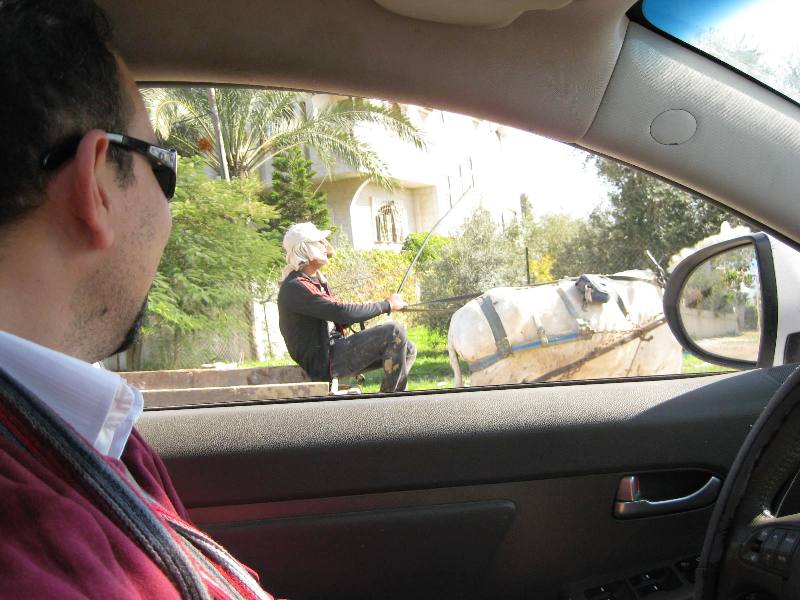
The people in Gaza use a lot of donkeys and horses for transportation and conducting business.
A special export of Palestine is the strawberry. When I tasted my first strawberry here, it was as if I had never tasted a strawberry before. Charming says the Dutch import them from Gaza and the fields are treated with great care and expertise.
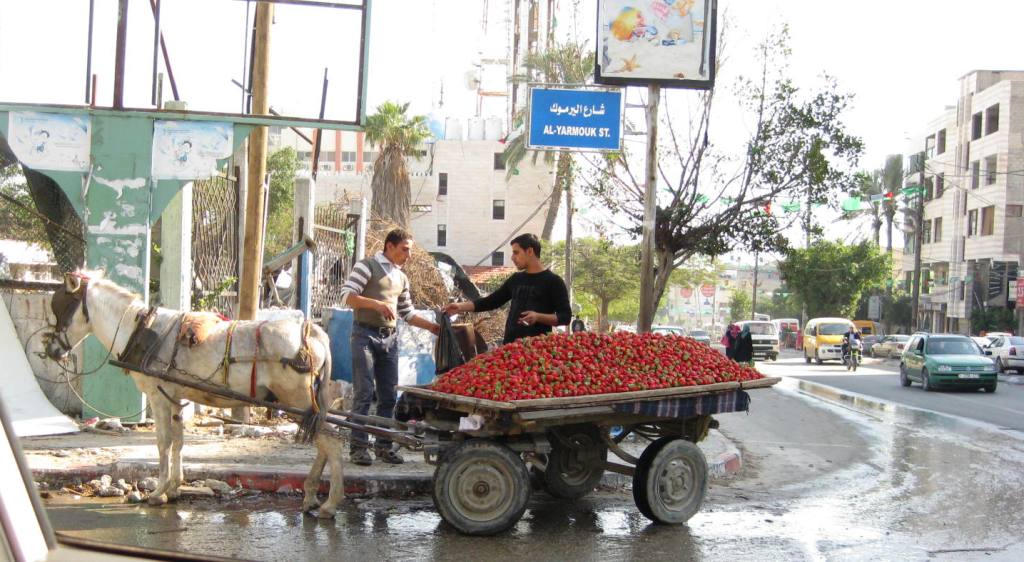
Once we arrived, Lulu, the office receptionist, kindly drove me around Gaza City so I could see the sights. Having already seen a lot of destruction, I was eager to see the beach.
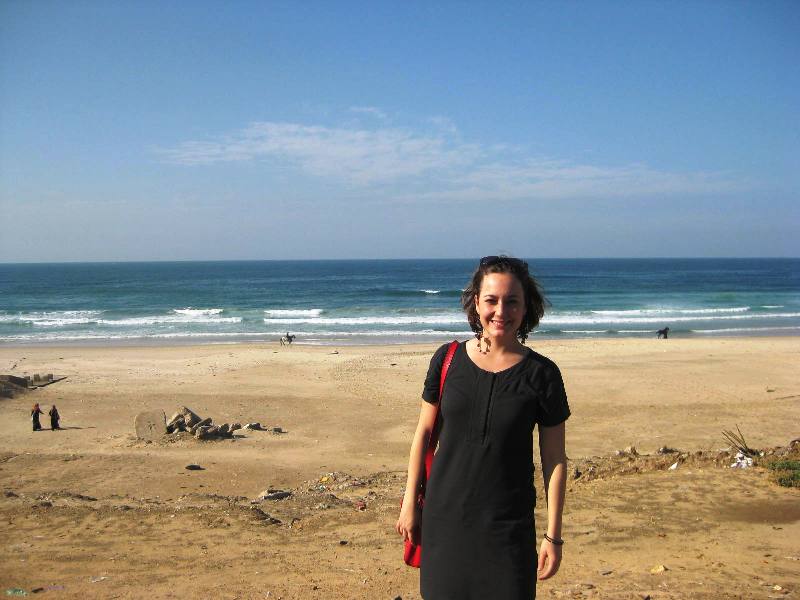
Enjoying the sight of the sea in Gaza.
It was lovely, this portion of the beach having had a walkway put in by Jawwal, our cell phone service provider. There were horses galloping along the water's edge. You can see them tiny in the background of the above photo.
But after that nice photo, I have to show you what happened before we saw the beach, before we had even left the street in front of Charming's office. As Lulu began to drive in front of Charming's organization, a group of men jumped out of a nearby car, and seemed to attack the car in front of us. Men jumped and were pulled out of that car. I didn't have time to feel scared. I snapped a couple photos.
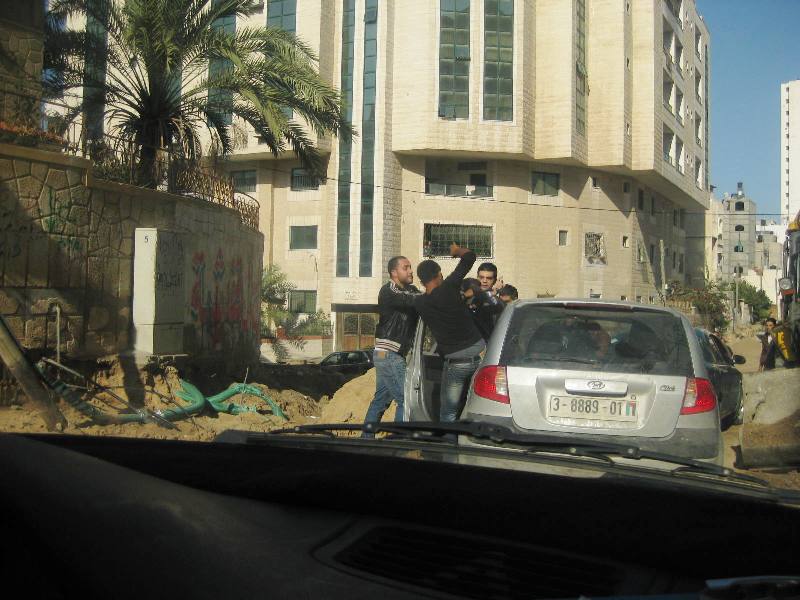
Lulu, composure and smile perfectly intact, backed up, and turned off onto another street. I simply thought the incident it was a bit of road rage on the under-construction, traffic-clogged byway. It wasn't until writing this blog post that I noticed the large knife in the brown-jacketed man's hand in the second photo. Was this a car jacking? A car burglary?
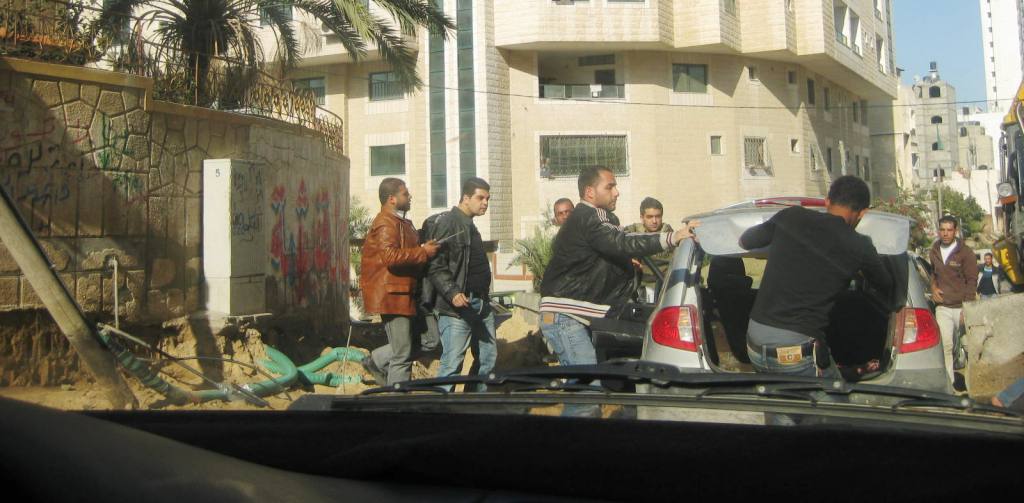
The second photo.
Maybe this explains why, a bit later, Lulu said "you don't seem scared. Some foreigner are afraid to be here." I was thrilled to be somewhere warm and sunny with an ocean view. I didn't think much about the underbelly attributes of Gaza until I was out.
Lulu took me to her future home, a fourth floor condo still under construction.
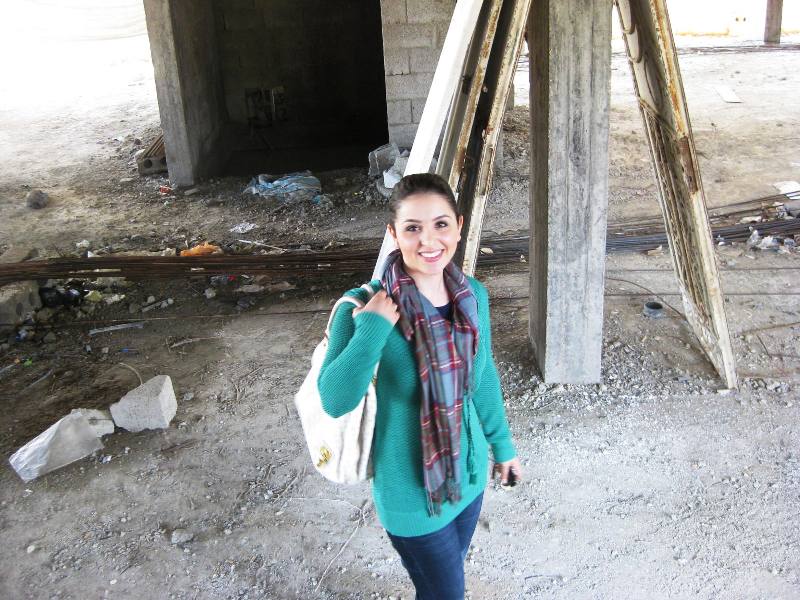
Lulu in her future condo building.
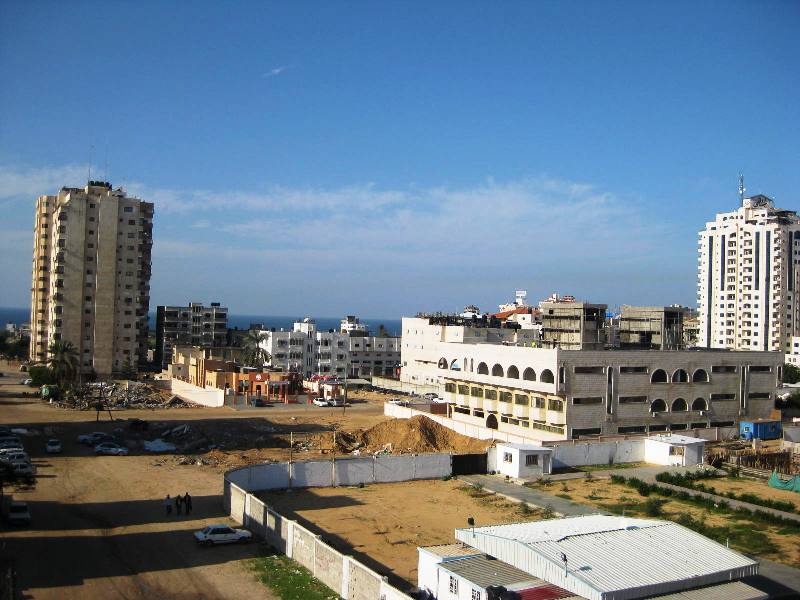
View from Lulu's future home.
We drove by the Gaza City fishing port.
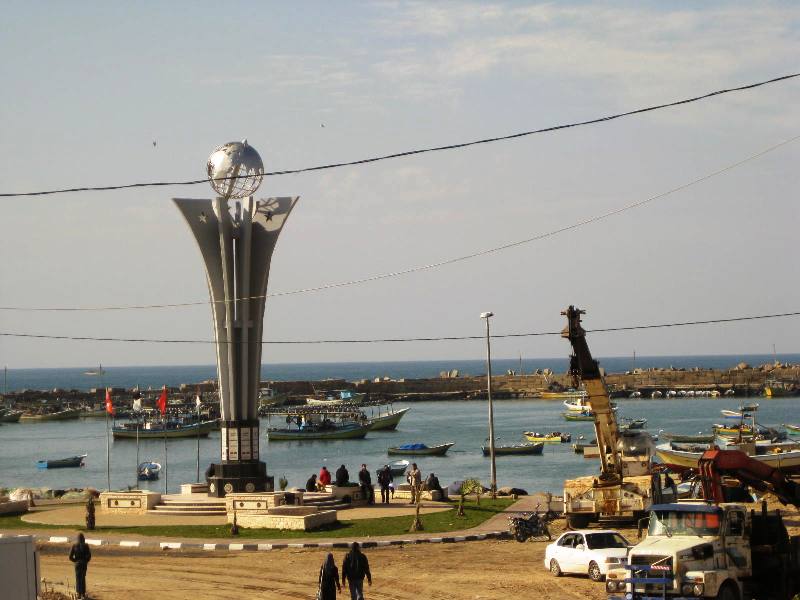
Like a scene out of a Tom Waits movie, near the center of town there was an abandoned circus. I wondered if I'd see a lion or trapeze artist roaming town, feeling lost.
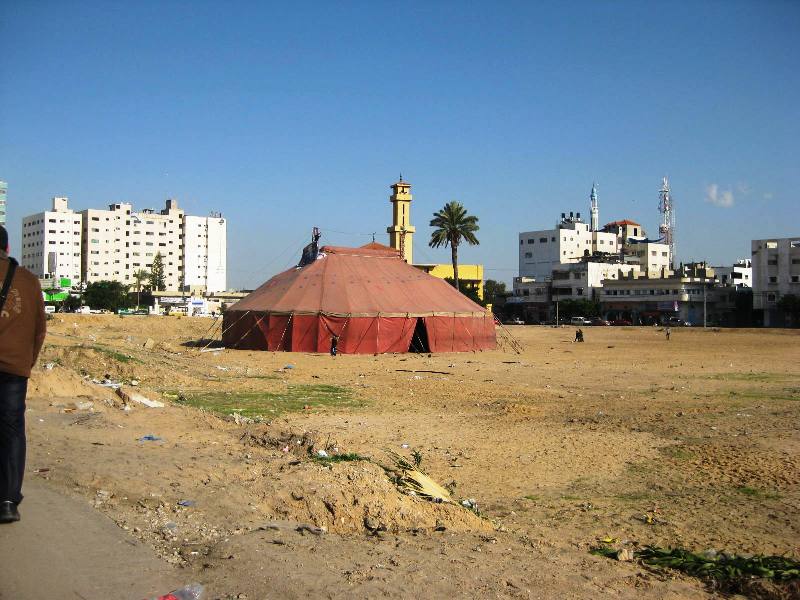
Finally, my tour ended at Lulu's family home where I met her mother, two out of seven sisters, and her brother. We had coffee and cookies served on a tray decorated with hand-embroidered cloth.
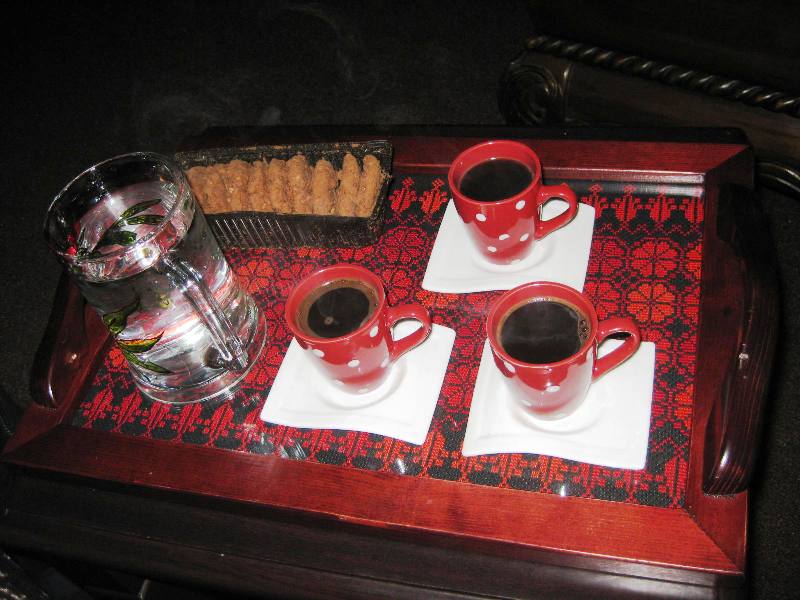
Rafah
Later that evening, we drove with Osama and Arwa down the coast to Rafah, which is on Gaza's border with Egypt. Tunnels connect Rafah to Egypt, and Osama said "Everything you see came in through the tunnels." The streets were filled with the same early-model Mercedes that most of the population drove, making Rafah feel like we were in a movie set in the 60's.
On the way to Rafah, we stopped at a fish restaurant splendidly located with a view of the water. The only sign I saw said "Fish Frsh." Fish Frsh kept live fish in large pools fed from the nearby ocean.
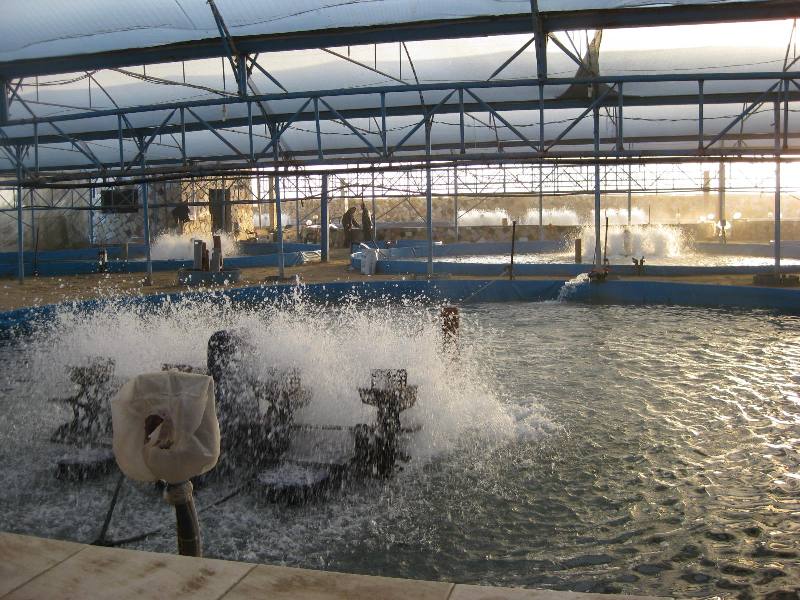
Patrons can attempt to net their own fish for their own dinner plate. I tried, as Prince Charming, Osama, and Arwa looked on.
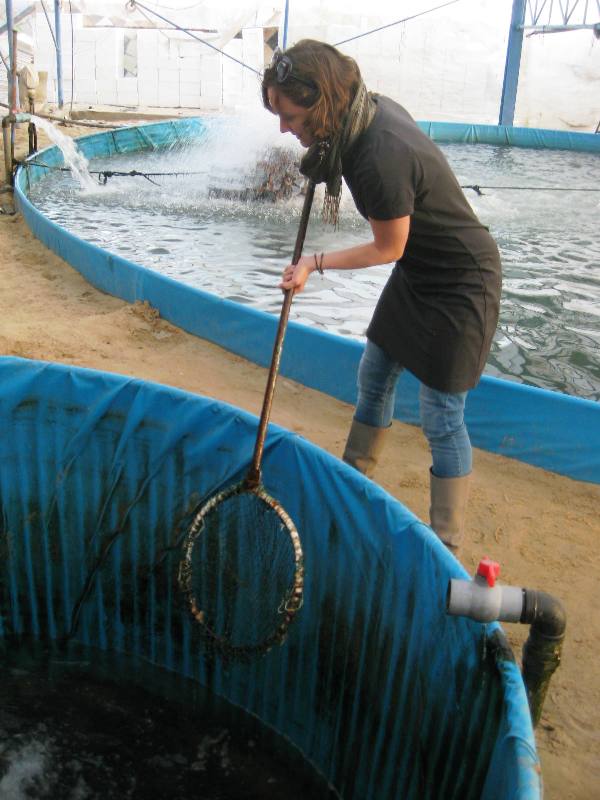
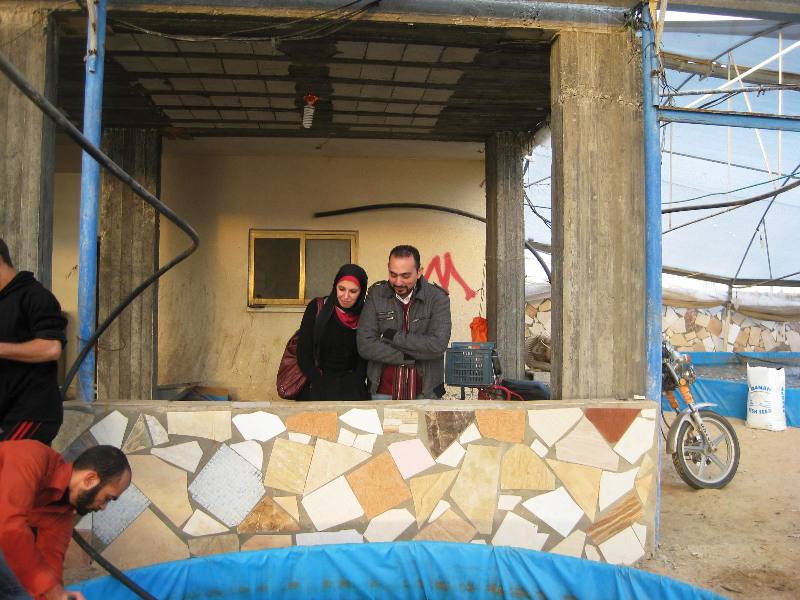
I failed. Osama said he'd never been successful either. One of the employees got down into the tank and netted us a couple of fresh fish, one of which showed up on my plate 20 minutes later.
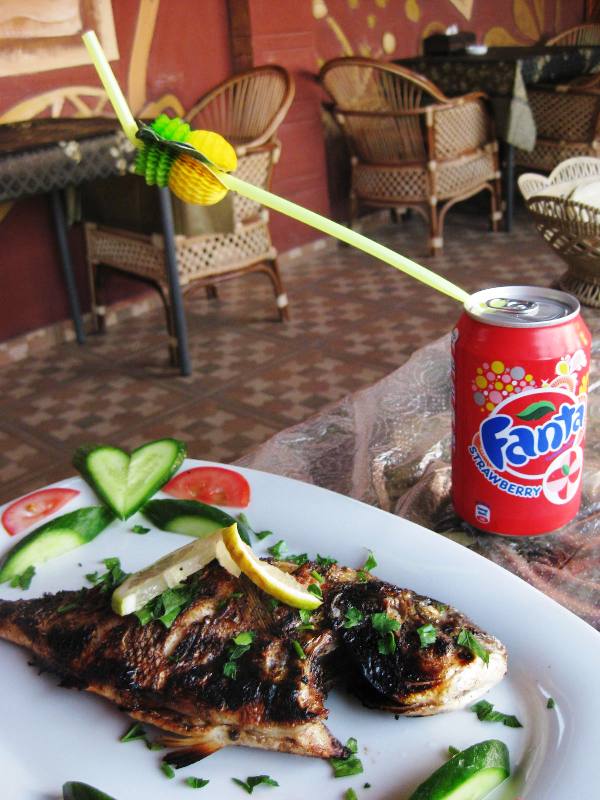
We had a wonderful time chatting and laughing over dinner with Osama and his wife Arwa. Osama is a big fan of argila, which is a very popular hobby/habit/vice all over Palestine. It's also called sheesha, hookah, or, affectionately, hubbly bubbly. We laughed over the fact that extreme Muslims frown on women smoking argila in public because it looks suggestive. Of what? Oh dear, the culture is far too genteel for anyone to actually say what it might be suggestive of. I'll leave it up to you to guess.
Many thanks to Osama and Arwa for being such generous and warm hosts who genuinely seem to love their adopted home, (they are descendants of refugees) yet are honest, educated, and well-traveled enough to rue the fact that they are stuck in Gaza unless they can get jobs overseas. Osama would want you to know that his favorite meal in the whole world is Kentucky Fried Chicken, and he wants peace for many reasons, but partly because he really wants Gaza to get the franchise. He also speaks with enthusiasm about how resilient the Palestinians living in Gaza are. Seriously, I can hardly overstate how kind, hospitable, and tolerant Osama and Arwa are. I wish them the best and hope for peace and all the opportunities they could ever want for themselves and their family.
Ladies Brunch
Prince Charming's office in Gaza is majority male, and so the next day the few ladies at the office invited me to brunch with them at a restaurant in Gaza City overlooking the ocean. I always ask permission before featuring anyone on the blog (except men who attack the car in front of me) but a few of the women at the brunch didn't feel comfortable appearing here, so the only photo I'll show you is of the view of the ocean when it started raining in the middle of brunch.
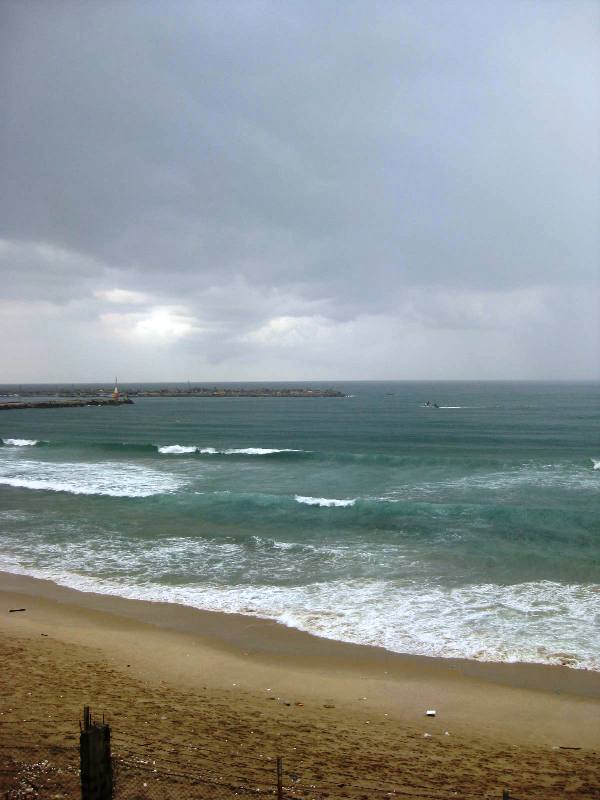
Apparently, it only rains a few times a year in Gaza, so this event was cause for great joy. The women got up and rushed to the window, opening it and putting their hands out to touch the rain. One of them told me "If you ask Allah for anything while it rains, he will give it to you." Another said that as a romantic, she loved to walk in the rain.
As you know, I'm coming from Ramallah, where it's been cold and rainy for weeks. I was surprised at their enthusiasm and then remembered how rare rain was in L.A., and how I'd felt a similar sense of blessing being poured from the sky when it rained there. I sat back and enjoyed the sound of the rain as it poured loudly on the roof of the restaurant where we sat warm and dry.
At the brunch, and several times throughout my visit to Gaza, I tried to find out about the details of the traumas and miseries of a) being in Gaza during the strikes, and b) being a woman in Gaza. My leading questions were not met with complaints or tales of woe. Lulu told me that the day after the ceasefire, everyone was arranging parties and gatherings. Osama drove by a group of men playing soccer by the beach and said "Is this resilience or what!" Others echoed those sentiments. The people of Gaza want to be happy and to have peace just like any other people in the world. They want outsiders to see that they are caring, strong, resilient, and hopeful. They try to see the blessing in the rain.
Exiting Gaza
Getting back into Israel from Gaza was a lengthier process than going in. We quickly passed through Arba Arba and Hamsa Hamsa, this time walking the kilometer from Hamsa Hamsa to the Erez terminal. (The tuk tuk wasn't around.) We walked through large turnstile doors, and then into a room with two large tables. The only direct contact one has with any Israelis during the process is with passport control. In this room, we couldn't see anyone, but Charming told me to open my bags and show them to a camera. The soldiers watching must have been okay with the contents of my bag, because a green light flashed on one of several entry doors, meaning I could go in. Charming and I entered a warren of small chambers separately. Nothing happened in my first chamber, except the light turned green, and I passed into a second, identical chamber. The red light turned green, but when I pressed the door, it didn't open. Someone uttered something in Hebrew that I didn't understand. I tried again, then realized I'd been pressing on the wall, not the door. I found the door, and it allowed me to pass into a luggage checking station. Again, I wasn't sure where to go, but when I looked up, I saw officials looking down on us from a glassed-in upper level. They motioned to me where I should go. Via this system of cameras, speakers, bullet-proof glass, and compartments, the Israeli officials are kept safe from would-be attackers.
We loaded our bags onto a conveyer belt, and another light turned green, allowing us to pass into the room where we picked up our luggage. We only had one more obstacle to get through: passport control. "What's your father's name?" The same well-manicured lady asked. I told her, and she said "What's your grandfather's name?" "Which one?" "You father's father." I told her, and she let me back into Israel. Charming's interview lasted much longer, about an hour. He and the nice-finger-lady chatted, and then he was sent back into the terminal to wait. Finally, after another chat, they let him through. His current passport/visa/paperwork situation is complicated and it took a while for the soldiers to ascertain the legitimacy of his papers. Once they did, we were free to re-enter Israel with a dual sense of gratitude and guilt for those we left behind.
How to Be Where You Are When Wanderlust Distracts
So we just found out we are moving to the country of Comoros! Just kidding. April Fools. But for those of you who were thinking "What the bleep is Comoros?" Wikipedia's short answer is "a sovereign archipelago island nation in the Indian Ocean, located at the northern end of the Mozambique Channel off the eastern coast of Africa, between northeastern Mozambique and northwestern Madagascar." It also happens to be one of the globe's least populous nations, but one of the most densely populated. In other words, it's a tiny country packed with people.
Our Wanderlust
Okay, now that geography lesson is over, I want to delve into something personal -- our psychology of wanderlust right now. Charming and I moved to Palestine in May and June of 2012, with plans to stay for the duration of Charming's two-year contract with his organization. Beyond two years, our stay was and is unknown. So that means in just a few months, we enter unplanned territory. And something weird happened to our mindset. It's weird and also weirdly familiar. When was the last time I had this feeling? The summer after my senior year of high school.
Spoiling the Nest
Let me start by saying that all of high school was an emotional roller coaster for me (and for everyone, I know) but I remember that by the time I graduated, my roller coaster was decidedly uncomfortable. I felt completely done with my hometown, my family, my friends, and anything I could possibly do for fun. My mom called it "spoiling the nest," and I certainly was. I was irritable and quick to complain. I lashed out and put distance between me and my loved ones. I was a bird who was ready to fly, but knew that to leave the comfort of the nest I had to convince myself that it was a boring place filled with stupid people. I needed the place and people to prove their negative attributes so that I could feel justified in leaving. I love my family, and my hometown is filled with dear friends. So those things I harped on weren't true, but my subconscious started to make them feel true, so that when the time came to leave, I didn't hesitate.
Similarly, I noticed I have been complaining more than usual about Palestine. I've been snarking on the repressive atmosphere, the constant harassment, the shoddy business standards, everything right down to the broken hinge on our toilet seat. Even though I can find those things everywhere in the world, if I look hard enough.
The Wanderlust Timer
Nothing seemed fun or worth doing for a while. I racked my brain. What was wrong? And then I realized it. I was spoiling the nest. Even though we have no plans to leave this place, my brain had been thinking two years, two years, two years, for so long that it was like a timer started going off when two years approached. A timer that said, "Ok, prepare for the train to leave the station." The wanderlust timer.
But the truth is, we may be here for a while longer. We don't know. The widening chasm between my geographical location and my mental location called for a recent attitude shift to bring them back to the same place.
Getting My Joie Back
I did four things to get my joie de vivre back and get back to Palestine mentally, instead of being here and not being here.
1. I talked it over with some friends and realized what was going on.
2. I imagined that we made another two-year commitment here. What would I do? What new places would I see, activities would I try, friends would I make?
3. I centered by focusing on my deeper purpose in life which I can live out with enthusiasm absolutely anywhere in the world.
4. I took action on a couple of things relating to #2 and #3 and put some new adventures into motion. (With help from my friends.)
I think these steps or some variation of them could be helpful if you find yourself drifting to some other place mentally and that drifting is making your current location or job or relationship seem not quite the romantic place it once was.
What do you think? What do you do when you need to enjoy where you are a little more? Please share in the comments.
What's Next?
When our friends and family ask "What's next?" I really like being able to give a concrete answer to that question. But the truth is, we don't know right now, and we don't know how long we won't know.
So for the time being, I'm focusing on enjoying my springtime nest right here in Palestine.
All Are Valid
I'll close with this excerpt from Mark Manson that I read and enjoyed today. It's from his essay "Wanderlust."
"The more places you go the less any single one is likely to satisfy you. As with any purely external form of satisfaction, there’s a cruel diminishing returns to it. Yesterday’s exotic is today’s bore. Yesterday’s news is today’s history. It’s the core of any addictive behavior: you need more and more and more, until one day you need less. Or even worse, you die never having known enough.
The more you see and experience, the more you see the overlapping of personality across culture, you see the universality of daily human existence, the common denominator of nature, and you understand that joy and relationships too, are location-independent.
You (hopefully) begin to understand the reward for any journey must be the journey itself or nothing at all — the moments of airport tedium as well as the exaltation of the world’s highest monuments; the anxious anticipation of the unknown as well as the jaded boredom of routine; the vanity of indulging in prestige and class as well as the humility of the living among the most downtrodden and unfortunate. All are valid and necessary. All are their own steps upon the same path of your life."
- Mark Manson
Dry Wanderings
We spend the last two weekends in February exploring nearby places that are just too hot and dry to enjoy during the arid summers here. The first weekend, we went down to...
The Negev Desert
Vision: Emotionally fulfilling stargazing and life-changing desert sunrises.
Reality: Overcast skies, dull clouds, freezing winds, and light drizzle.
Before we left, when we confirmed that the forecast was going to dash our star-gazing dreams, Prince Charming asked me if I thought we should still go.
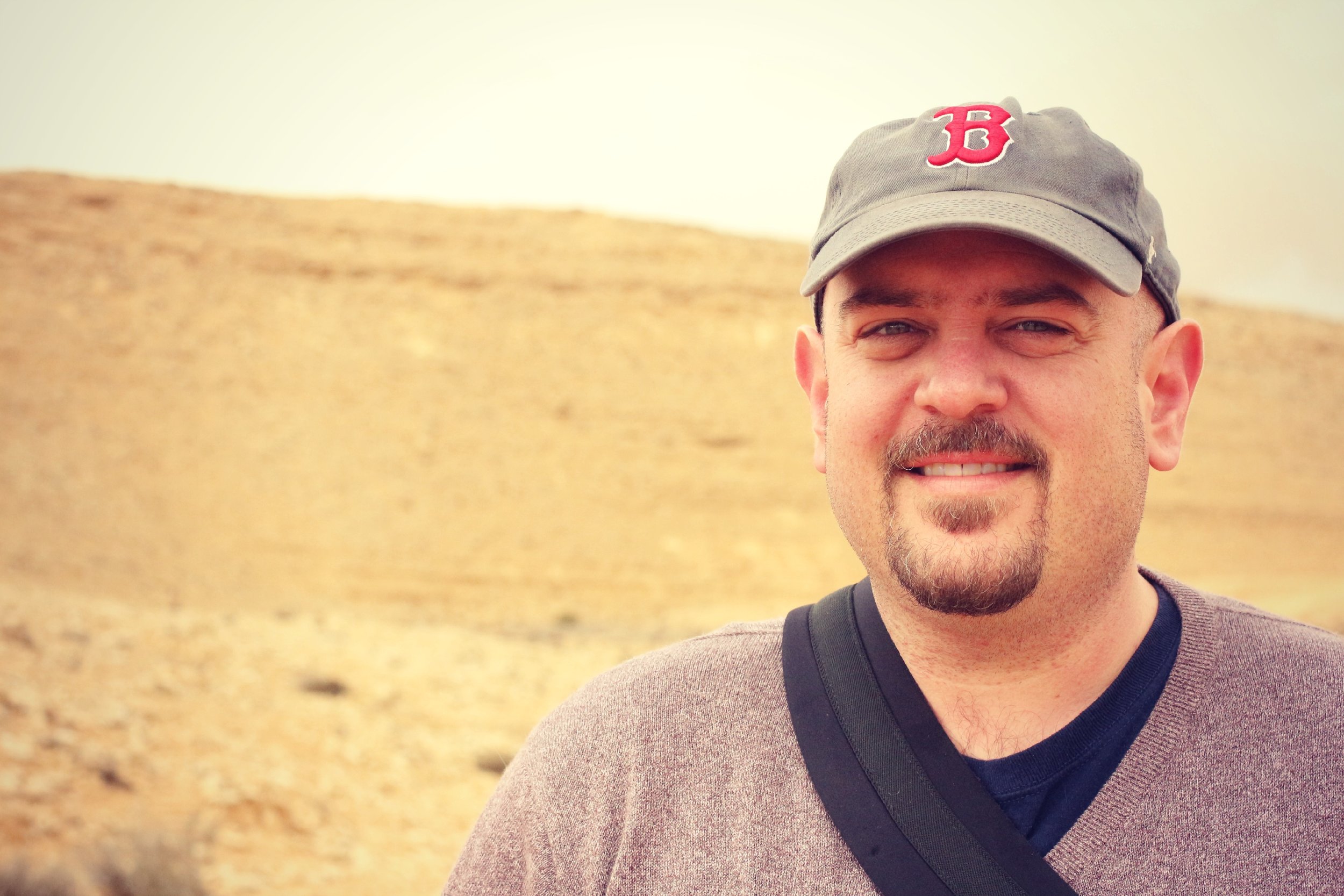
"Yeah," I said. "We'll go and have fun despite the weather."
And we did. It was cold and the skies were lugubrious, but there was something charming about the town of Mitzpe Ramon, Israel. It's a small outpost that has attracted a combination of hikers, outdoor enthusiasts, and eccentric artist types. And you know how much I love eccentric artists types. Charming and I always feel comfortable in places inhabited by eccentric artist types. And I also love outdoor enthusiasts. So I felt right at home.
I took this picture in Mitzpe Ramon. It's a bicycle (outdoorsy type thing) that has been covered with white fuzz and turned into a permanent art display (eccentric artist thing to do).
Here's the rest of that art installation:
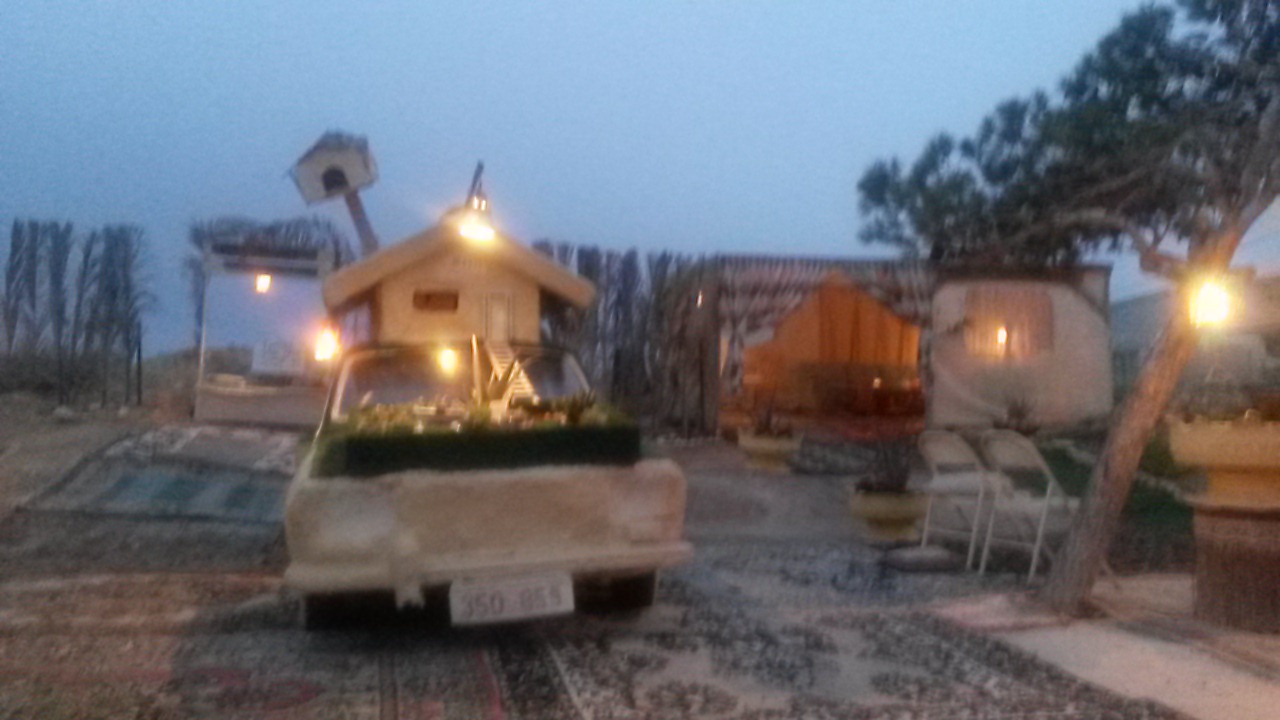
I think it's impressive that Mitzpe Ramon has attracted anyone at all, considering that its claim to fame is a hole. A very large hole in the ground. We couldn't find the hole at first, so we drove around, asking each other do you think the hole is over there? Could it be over there by those nice apartment buildings? Maybe if we follow the sign that says "visitor center."
Then, after a frigid walk/jog up an incline, we came upon the hole.
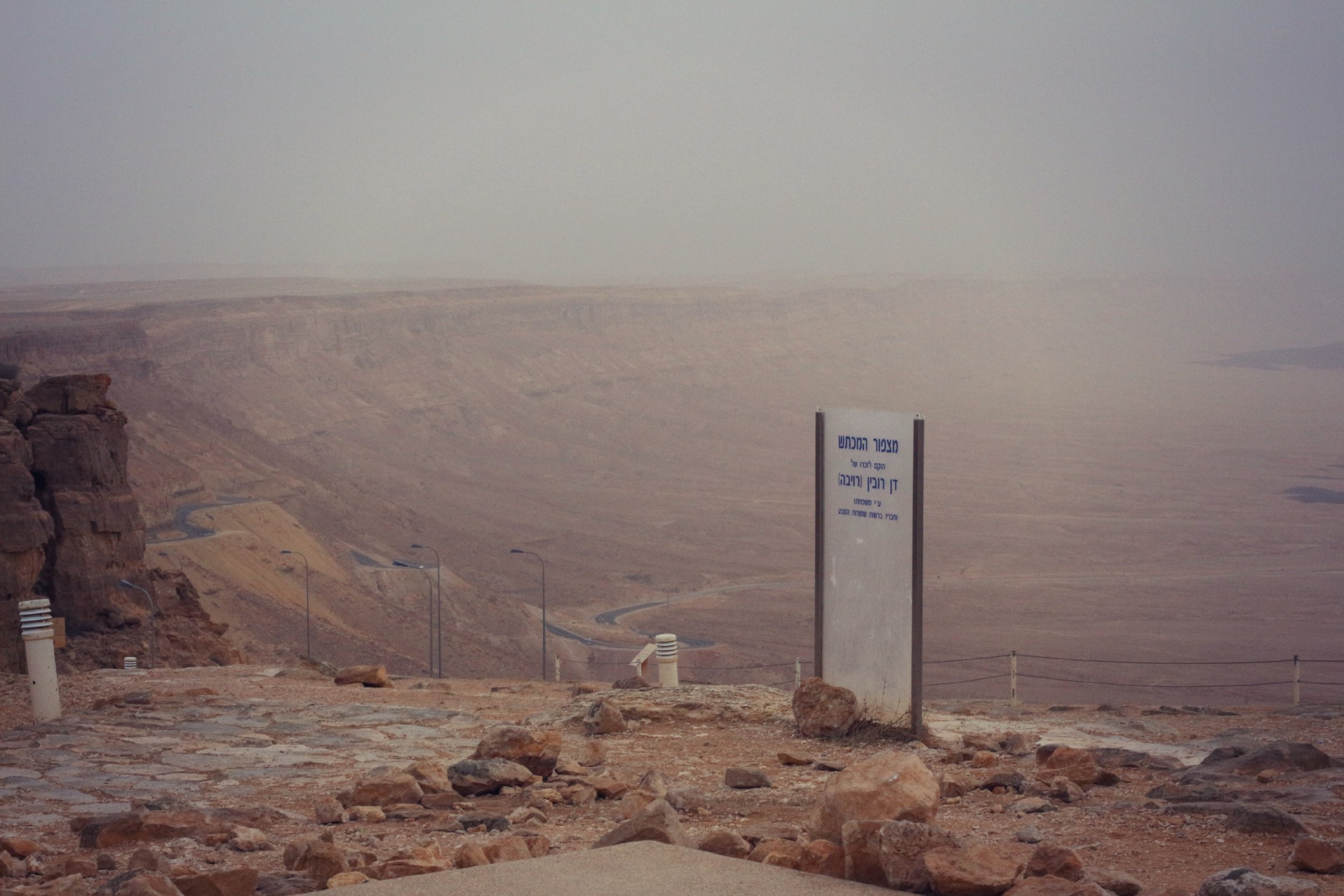
According to TouristIsrael.com, this hole is the world's largest erosion makhtesh. Makhtesh is often translated as "crater," but that is misleading since this hole wasn't caused by an explosion or the impact of a celestial body.
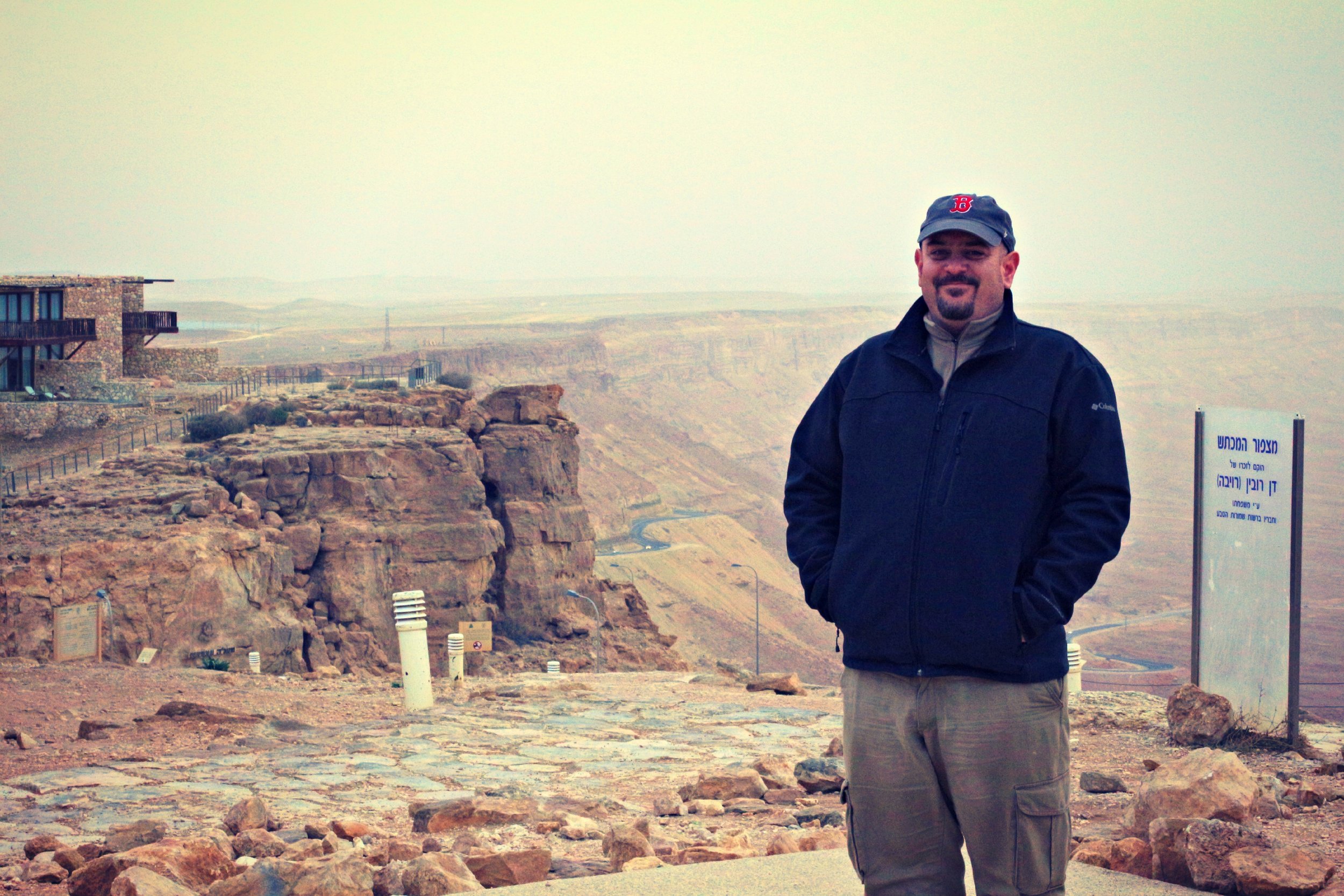
A better translation of makhtesh, perhaps, would be "erosion circle," or, "big ol hole." Geological forces created this superlative wonder some 220 million years ago.
It was pretty chilly on top of that hole in February.
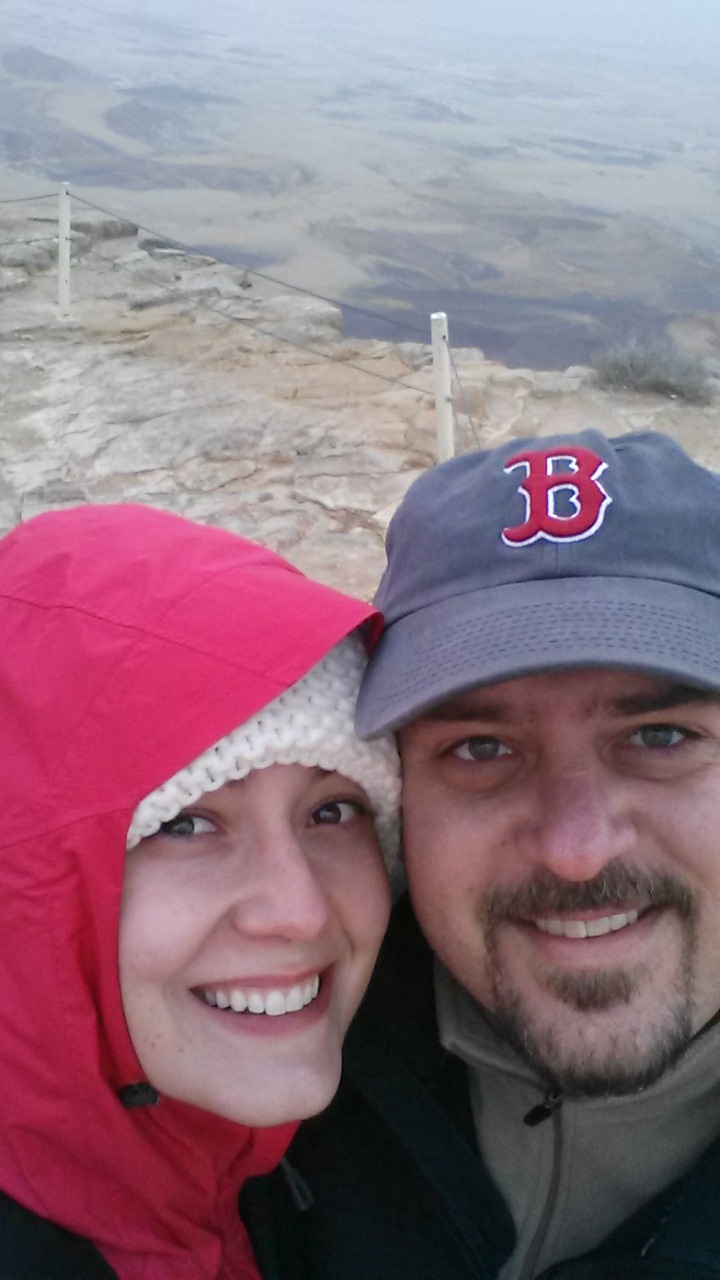
Here's a photo (from the Shalom Israel Tours website) of the hole on a better day.
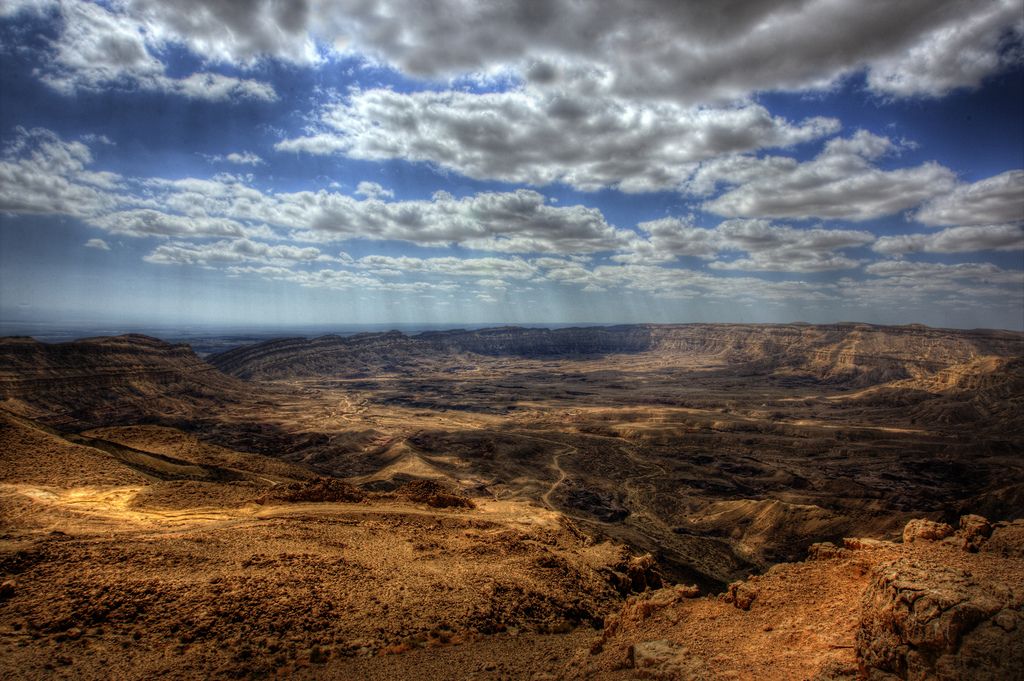
We stayed at a desert-hostel-camp rather chillingly called "Silent Arrow." The place was so hipster that it had an ironic jacuzzi.
It also had a friendly owner and volunteers, and a great vibe. We stayed in one of these tents:
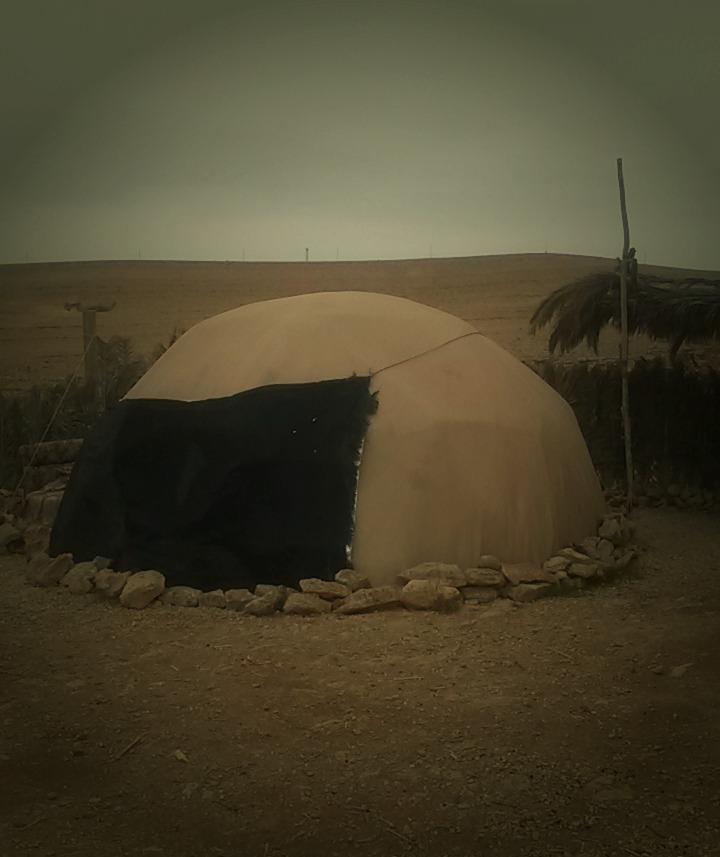
wadi qelt
The next weekend, we decided to do some hiking in one of the longest and most famous valleys (wadis) in Palestine: Wadi Qelt. To hike the whole thing from Jerusalem to Jericho takes about 10-12 hours, depending on the weather, your speed and your fitness level. We wanted the gentle stroll version, so we just drove around until we found an entrance (we knew because there was a tour bus, a camel, and some bedouins) and started walking around. We started at the top of the wadi. By the way, my vision is that I can always get my dog to look at the camera. Reality:
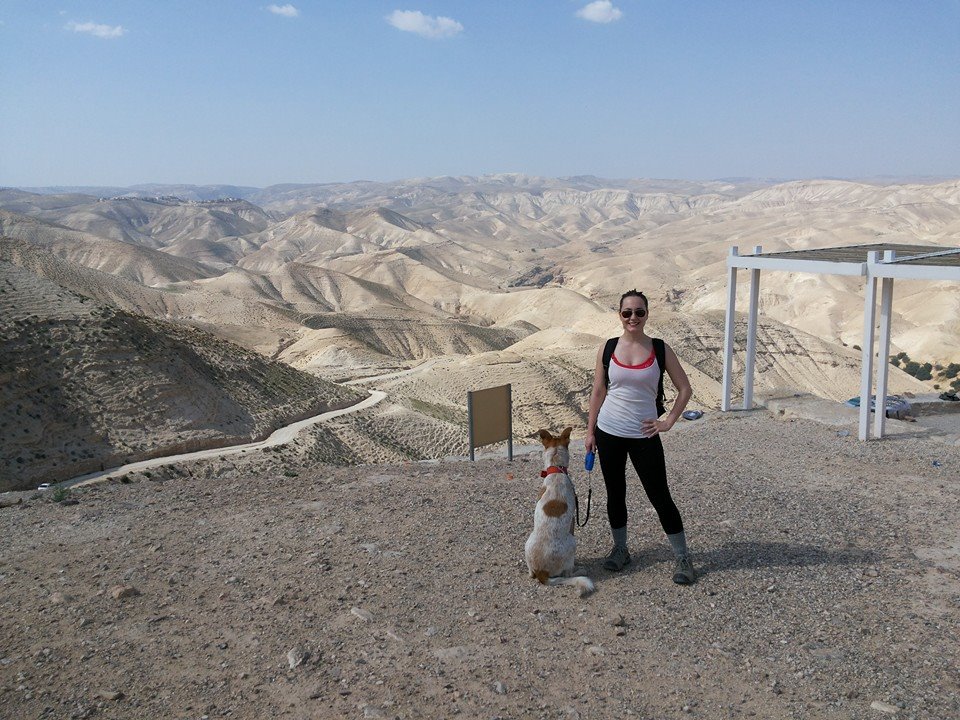
After photos, we drove down into the wadi. That is, Charming and I rode in the car, and we made Jelly run behind us. She needed the exercise.
Once almost to the bottom of the wadi, we got out and hiked around. At the very bottom of the valley, we heard the delightful sound of bubbling water, and followed it to this narrow aqueduct:
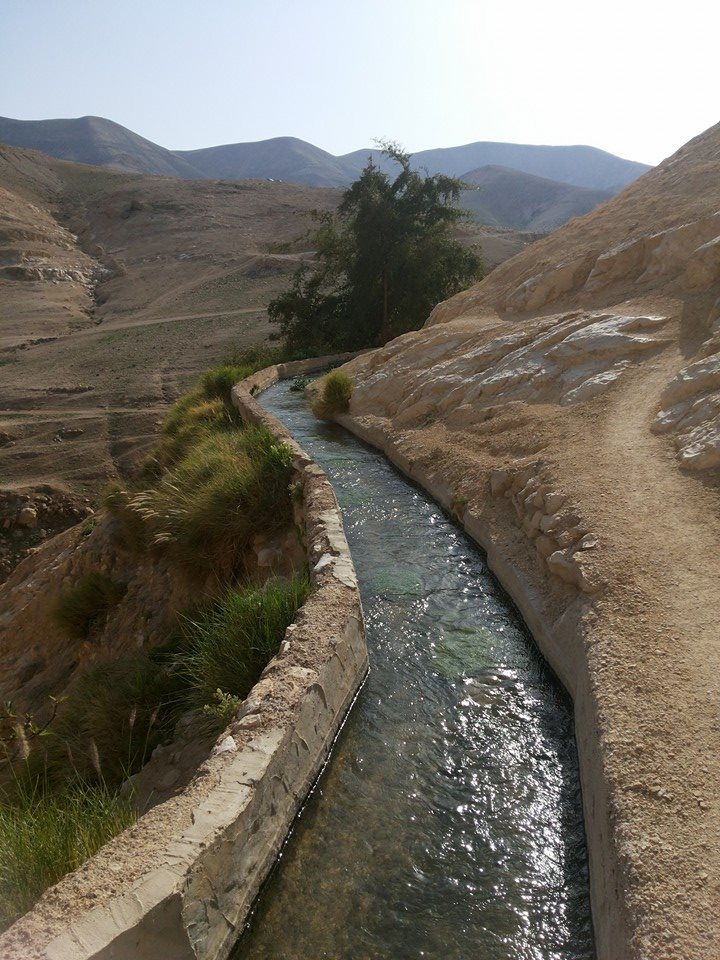
We found a green spot amidst the brown for a nice picnic lunch.
One of the most famous spots in the Wadi Qelt is St. George's Monastery. But by the time we got back to the car and drove to the monastery, we were tired. We quickly became discouraged about the amount of energy it would take to run the gauntlet of hyper aggressive bedouin jewelry sales representatives at the entrance to that section of the park. So we went home. We'll have to save St. George's for another day, or just enjoy photos of it online.
Most of the time when traveling, things don't turn out the way you think they will. Although neither of these trips turned out perfectly, they had unexpected joys.
What about you? Do you have a traveling story where things didn't turn out quite like you expected? I'd love to hear it in the comments.
My Love Note to Juthour
I was recently hiking at Juthour, an arboretum eco park on the outskirts of Ramallah, Palestine. It was just before sunset, and this February day was especially stunning. The air was clear and warm, but the earliness of the season meant there were no annoying bugs out yet. We could see clearly for an especially long distance all the way to Tel Aviv. As I walked up the hill with a couple friends, chasing the sun before it sank down into that western hillside, I thought of how grateful I am for Juthour's existence. My gratitude quickly turned into a desire to help Juthour grow, since I know that the land Juthour protects is under constant threat of development, bulldozing by Israeli extremists, poisoning by shepherds who fear the wild boar, and toxic construction waste dumping. Whew, that is a laundry list of threats to this beautiful land:
When I told Morgan, one of the co-founders of Juthour, about my urge to help preserve this piece of land, she suggested I write a blog post about it. So here is my little love letter list to Juthour.
My gratitude is especially deep when I think about these nine special attributes of Juthour:
- It's on one of the last undeveloped hillsides near Ramallah, so I don't see or hear construction noise as I enjoy nature.
2. It's proximity to where I live in Ramallah means that I don't have to make a day trip of it, and plan a hike only for special occasions. I can zip out there any time for a quick hike.
3. I can go with friends or alone, and feel safe because the friendly park rangers are frequently in the arboretum, and they expect to see me.
4. I can run on the dirt road around Juthour with my dog, without fear that people will stop and try to steal my dog because no one drives on this quiet dirt road.
5. Not only is there already an incredible variety of trees, flowers and birds at Juthour, but the park rangers are always adding more botanical treasures to this eco-park.
6. The park founders take action by reporting nearby illegal construction dumping, so I know that there won't be huge piles of trash around my hike, like there are in other hiking spots around Ramallah.
7. Juthour (which means "roots" in Arabic) is being preserved so that people can learn about and enjoy Palestine's natural beauty, so I feel welcome there as a hiker.
8. The park founders are dedicated to peaceful, non-violent resistance of the Israeli occupation of Palestine, so I'm supporting a good cause by supporting Juthour.
9. I can be inspired by the founders, who are resilient in the face of setbacks. I know when and if the Israeli government or extremist settlers destroy the trees in the park, the founders won't give up on saving the land, but will start planting the park all over again, always in a sustainable way.
I hope this natural treasure continues to grow and thrives so that Palestinians, expats, and tourists alike can enjoy the incredible sights and sounds of this special place. Are you a hiker and nature lover? Like the Juthour Facebook page to show your support for the eco park.
Top image credit: Juthour Arboretum. The others are from my Instagram feed, which you are welcome to follow.
How to Offend Your Neighbors
I had good intentions. I truly did.
I wanted to paint every room in my house a different color. At the paint store, Morgan (my downstairs neighbor) and I chose what we hoped would be a deep, calming blue, like diving into a swimming pool on a hot day. It turned out looking more like Smurf blue. Okay.
Once the blue was done, I decided to paint one of my favorite spiritual quotes on one wall.
I read "Only love is real" in a book about A Course in Miracles, and I thought it would make an inspiring quote for me to contemplate each day during breaks from work.
I began, painting high on a ladder in thick, white block letters.
I soon finished, happy with my wall.
But then Morgan gently noted that I hadn't left much space between the "is" and the "real."
Since I wrote it high on the wall, it was visible from the street below, as we are on the second story.
So to Palestinians passing by -- people affected every day by the brutal Israeli occupation -- it looked like my wall said:
"Only love isreal." Or, to the quickly glancing eye,
Only love Israel.
And I had written the unintentionally political message in white on a blue wall, exactly the colors of the flag of Israel.
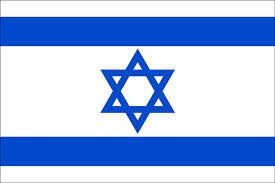
Who does that? Sets out to write an uplifting spiritual quote and ends up reminding her neighbors of the bane of their existence?
Me. I did it. Hahaha.
Although this happened close to when we moved into this apartment back in March of 2013, I thought it blog worthy now, since each time I tell the story it gets funnier. Mistake + time = funny.
Don't worry, I hussled back up that ladder to paint over the "real" with my Smurf blue. I moved it way over to the right and down, at such a safe distance that "is" and "real" could never, ever, be in danger of turning into "Israel."
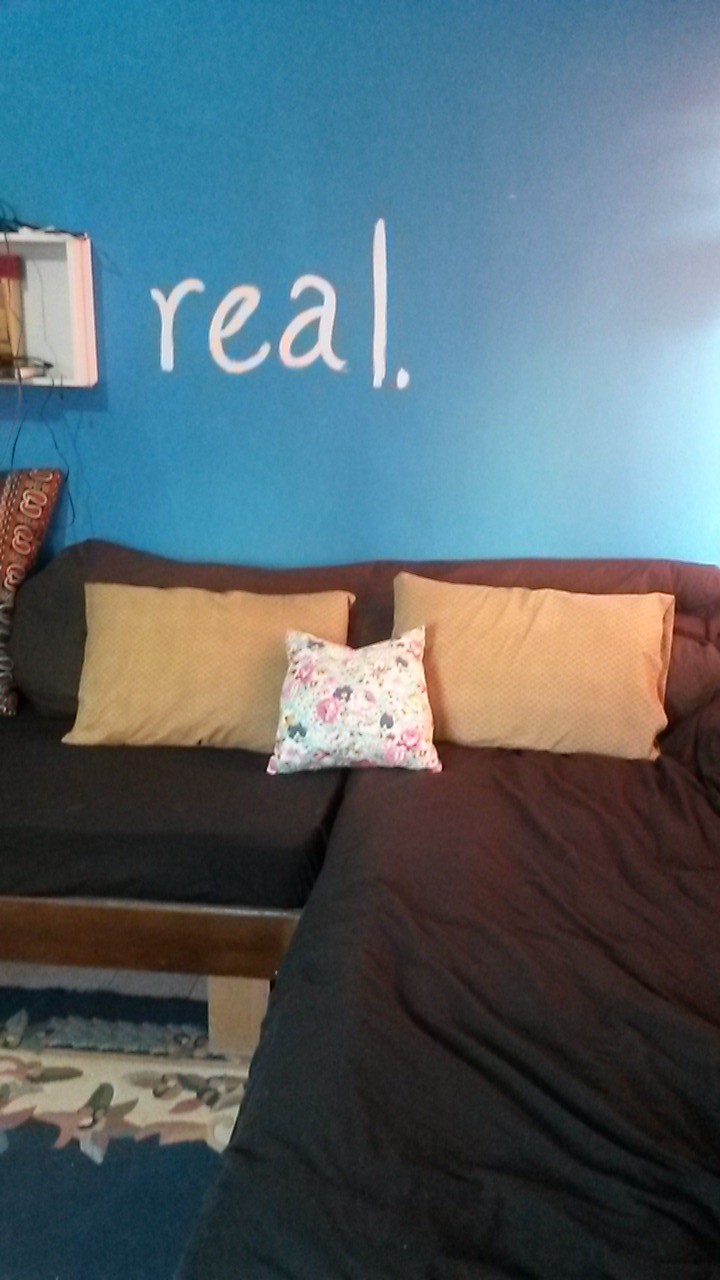
Now the wall looks like this:
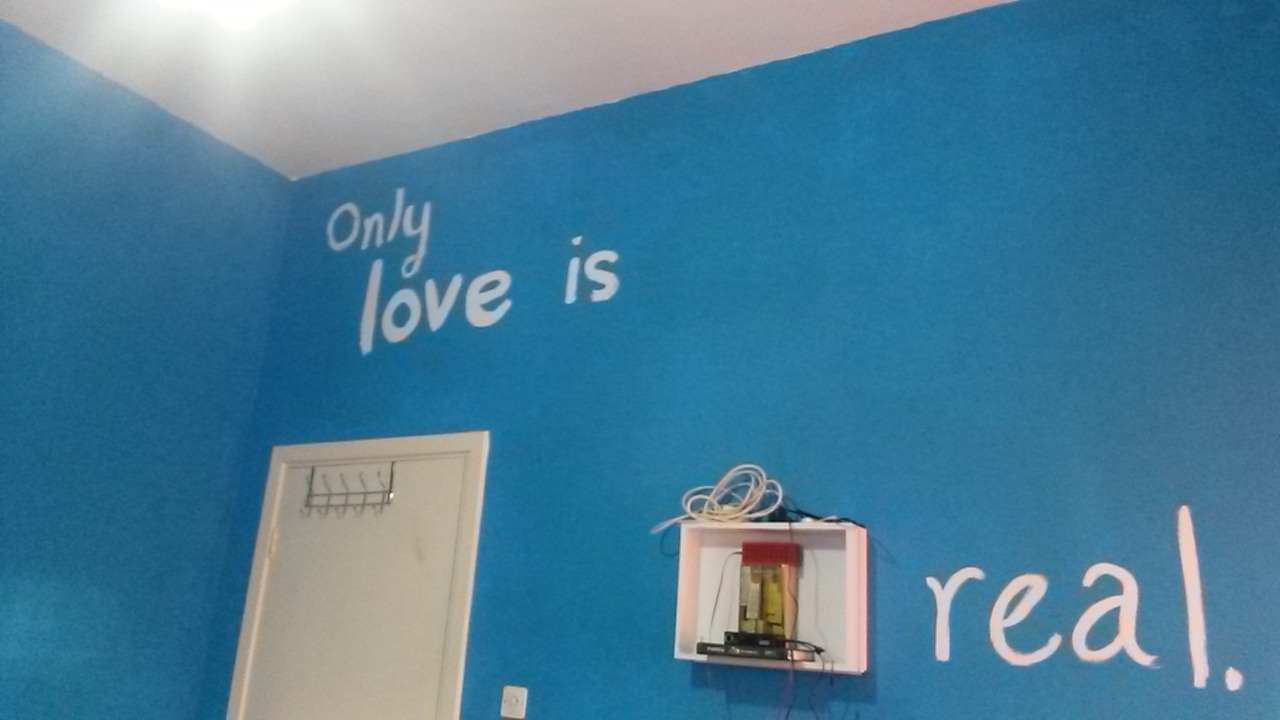
Lesson learned. Don't move into the middle of an oppressed people group and write a pro-oppressor message on your wall.
Love is real,



